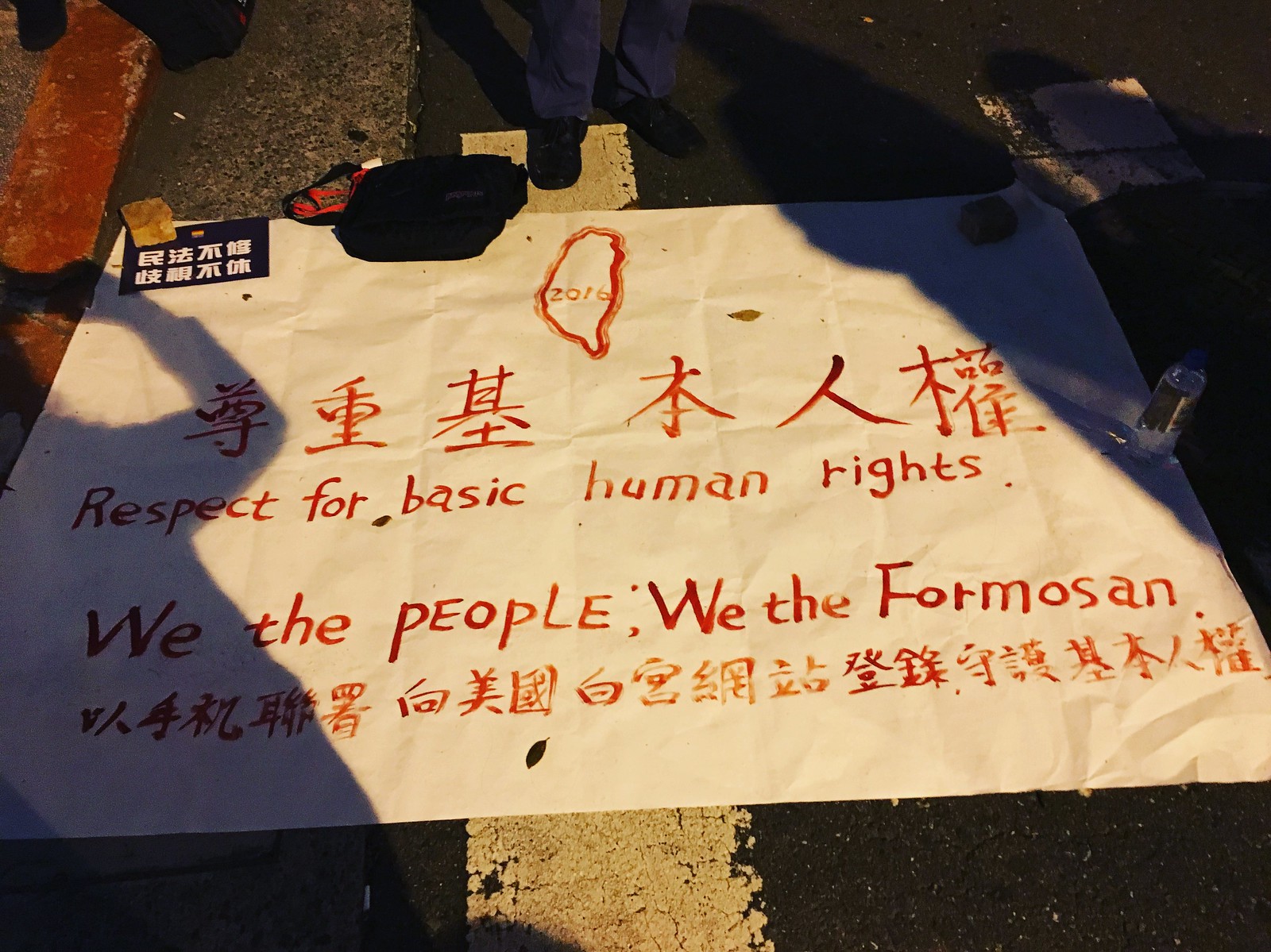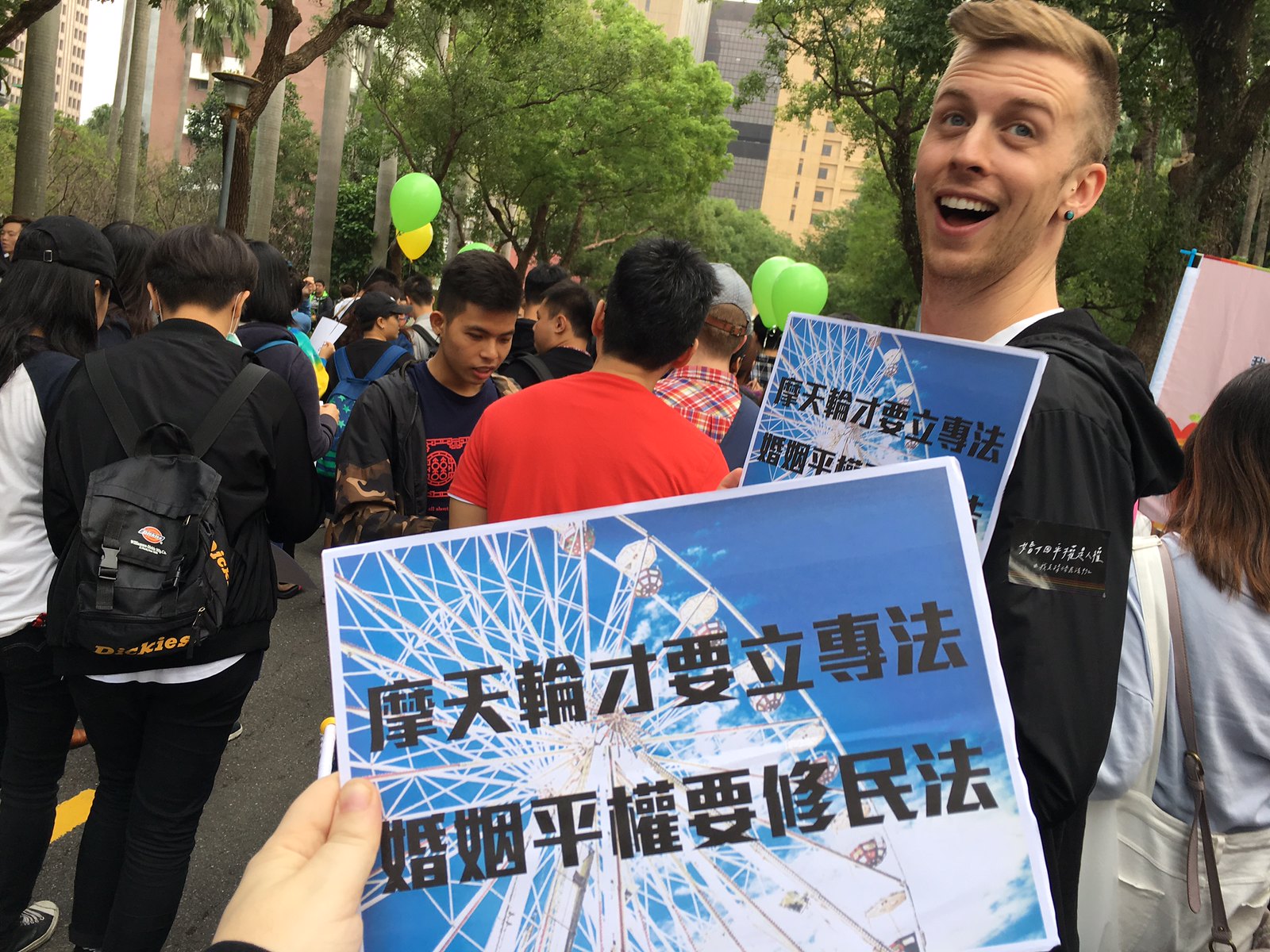Today was disgusting. So was yesterday. I don't mean I had a bad day. I mean the air was literally disgusting - it made my throat scratchy, my nose inflamed, my eyes sting and my stomach a little upset.
I felt annoyed, ill - literally sick, disgusted and nauseated - but something else too. I felt a deep-seated, wide-ranging anger.
Years ago, I was hanging out with my (adult) students and nuclear power came up. I said that while I agreed nuclear power was a bad idea in Taiwan for a number of reasons, I didn't actually support phasing it out immediately, while Taiwan's energy policies in other areas were so short-sighted. Of course I was aware of the problems with nuclear power: nowhere to store spent fuel rods, "dirty plants" where safety standards were alleged to not be met, especially around cooling/recirculation tanks (despite assurances that they conformed to a high standard of safety), and of course the fears that Taiwan's vulnerability to natural disasters. These include earthquakes, typhoons and tsunamis - could result in a Fukushima-style disaster in Taiwan, where such an event would be even more disastrous given the country's size.
But, what was the alternative? Fossil fuels? That would not only be bad for the environment as a whole, but for Taiwan's air quality in particular. Alternative energy would be best, and we probably have the technology to make that a reality for most of our energy needs, but nobody seemed interested in actually developing it. There has been some investment into wind power, but not enough. Besides, even though I don't think wind is the answer, the same activists who campaigned to shut down the nuclear plants also campaigned against wind farms (sometimes for good reasons, I should add.)
Solar comes with its own set of government cock-ups that are only now being rectified: the government is only now tackling harmful and outdated regulations regarding energy generated through home solar panels (in the past, you had to sell the power you generated to Taipower first at a crummy rate, and have it sold back to you. Hence, nobody bothered to explore solar power for their homes.)
The push to explore solar and geothermal generally was limited and insufficient (given how geothermically active Taiwan is, geothermal is probably our best bet - but not a lot of money being poured into it). Taiwan's buildings would need to be restructured in a huge way, or at least, any new buildings would have to take the country's climate into account, building in cross-breezes, overhangs and using the right materials to reduce how much air conditioning was necessary in the summer. No more stifling concrete boxes.
And I just could not support gunking up Taiwan's air by going back to fossil fuels.
Even when trying to clean up fossil fuel-powered plants, it's a hash. As my friend and Central Taiwan news guru Donovan Smith noted:
In fact, Taipower recently announced they are adding two new gas-fired units to the Taichung Power Plant, bringing the total units up to 12. Many or most people had thought they were going to use those two to replace two of the coal-fired units, but nope. A general rule of thumb is gas-fired units are about half as polluting as coal. That means cumulatively that is effectively adding one more coal-fired unit.
Fast-forward to today. And yesterday. And so many days before.
The left won: the nuclear plants are shutting down. The chances that the fourth plant at Gongliao will be finished and activated are essentially zero - and frankly, bringing it online is a bad idea anyway.
And now the air is filthy. In much of Taiwan it has been for awhile - Taipei folks just didn't notice it because it rarely impacted us. All of those power plants and other industrial waste-producing hellscapes were far enough from us that our air was still relatively clean. Now we're getting a taste of what the rest of the country has been saying for awhile.
The Taiwanese left was unforgivably myopic: they yelled and screamed to shut down nuclear power, but didn't present any sort of push for consistent renewable energy policy. "I guess pushing for renewables isn't as sexy as pushing against nuclear," people who understood my point said. "They're just not going to win the zeitgeist talking about that."
Okay, but if you don't, and you only shout about what is "sexy" enough to get attention, then your push to change society can have unintended consequences. You're nothing but gadflies, not serious policymakers searching for real solutions.
If all you do is push to shut one thing down without thinking ahead to how things will be handled in the future, frankly, that's no more visionary than the KMT building a bunch of crap-ass buildings in the 20th century that are all now falling apart and are so energy-inefficient it's a joke because they couldn't be bothered to spend real money creating sustainable architecture for a subtropical climate, and building most cities in Taiwan without viable public transit which creates vehicular pollution. All you're doing is creating another problem.
Real change means tackling the unsexy things. It means actually writing and pushing policy proposals that solve issues and take future consequences into account. It means thinking through your own freakin' beliefs to see what the outcomes might be, and addressing them. I don't see that that has been done by anti-nuclear activists or the people they've put in power.
Yet, even now, I see few from the anti-nuclear activist camp going to bat over renewable energy. Some of them are protesting air pollution: great - but ultimately ineffective. I'm sick of protests that don't offer solutions.
So what we will have is a ghost island: not just in terms of talent leaving, but also the ghostly pallor of the grey air. The ghosts of good intentions, the ghost of what Taiwan could have been if the right people just thought through what really needs to change and pushed for it in the right ways.
So we have the activists/Third Force/Taiwanese left putting on a great show of wanting to change Taiwan - and I do believe they are sincere. But they're just not thinking their ideas through and it's infuriating.
Then there is the KMT. In the words of New Bloom:
In truth, if there is any one to blame for issues regarding nuclear energy or air pollution in Taiwan, it is the KMT, which ruled over Taiwan’s developmentalist state unchallenged for decades during the authoritarian period and built up both the coal-fired power plants that contribute to Taiwanese air pollution and the nuclear power plants which many see as dangerous to Taiwan in the event of environmental catastrophes. There is no political party in Taiwan more beholden to the nuclear lobby than the KMT. Yet the KMT leverages on these issues anyway against the DPP, illustrating not only hypocrisy, but how the KMT truly stands for little else besides rote opposition to the DPP at this point.
However, I disagree with the overly-tidy (and easy) conclusion that we can brush our hands, blame the KMT and move on. As the party who has historically held power, they do deserve most of the blame. However, the left's lack of initiative in finding real energy solutions to make their anti-nuclear rhetoric sustainable also deserves criticism.
Then there's the DPP, who are mostly concerned with staying in power and don't seem to be interested in addressing any of the real issues. Caving to the anti-nuclear activists, leaning more heavily on fossil fuels, and just not doing what needs to be done to make renewable energy a reality.
Amidst this circus, the electorate acknowledges it's a problem but only ever blame the party in charge, or the party they don't like. I'm sure many do look more deeply at the bigger problem of nobody in charge having the faintest idea what they are doing or when they do, using it for their own gain, but I don't see it. I have to hope their are better people working behind the scenes, but I don't see that, either.
I don't know what else to say. I'm mad and disappointed, and I can't breathe. Those in power don't seem interested or able to really fix the problem. The opposition is, if anything, worse. The Third Force activists don't think through what they fight for nearly as often as they should. Taiwan has smarter people than this. We can do better.
Don't get me wrong, I'm still a leftie liberal bleeding heart bastard. But, I support doing the difficult, unsexy work that I feel the Taiwanese left is not doing - the stuff that's not always so wonderfully idealistic. I'm still pro-independence and pro-Taiwan. I still think this country is worth fighting for. I just can't support half-baked activism anymore. We can't trust the KMT or DPP to get us out of this mess, which means we have to look to the left, but the left needs to be smarter. It needs to start tackling unsexy issues.
Showing posts with label new_power_party. Show all posts
Showing posts with label new_power_party. Show all posts
Monday, April 30, 2018
Sunday, December 3, 2017
民進黨不行,國民黨再贏: on dragons and not riding them
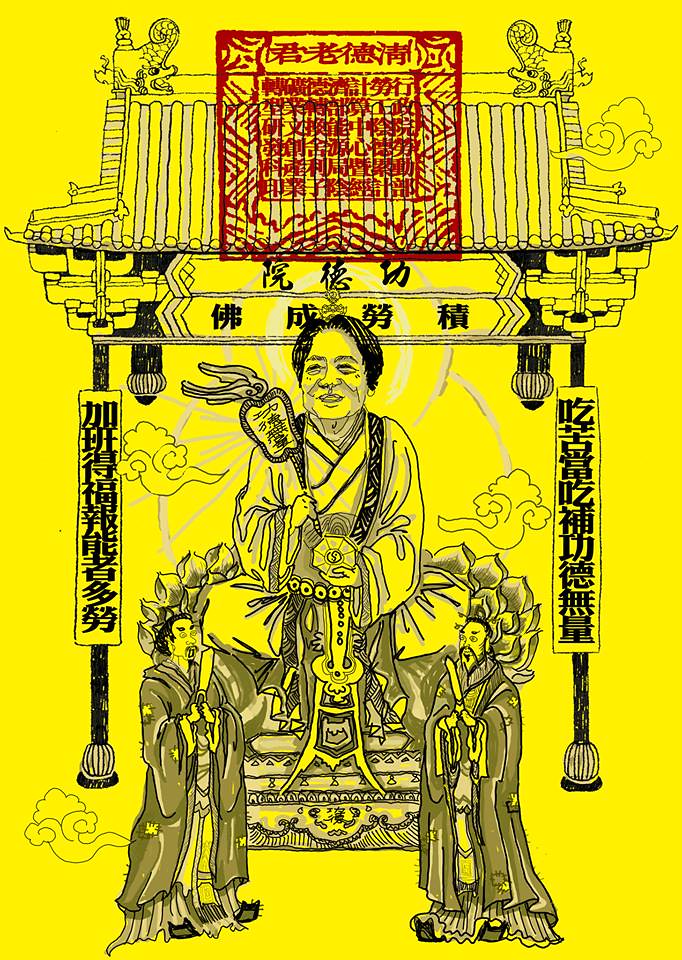
Look, I know I said I was going to take a break, but I'm taking a break from taking a break so here you go.
Still working on my personal junk, you'll hear about it when I'm ready to talk about it. Still working on grad school, just needed a break from that. Don't worry, I'm plugging right along.
Anyway.
I'm not particularly surprised that the DPP has turned around and betrayed Taiwanese labor with their new bullshit changes to labor regulations. (Quick note: the seven public holidays mentioned in this article only snapped back into existence for a year - otherwise, we haven't had them for the entirety of the decade I've lived in Taiwan. They're also not great holidays, to be honest. It's not as though we lost something we'd grown used to over many years.)
They might have a better origin story - I mean, they didn't commit mass murder and pillage and steal from Taiwan for decades after flying and sailing over from another country and settling in like they owned the place - but their ascendancy to the main opposition party of the (even worse) KMT hasn't left them as pure of heart as they might have started out. Sure, they began more idealistically but I don't think anyone can realistically say that they've maintained their dangwai-era vision. They'll line their own pockets, set up their own patronage networks and kowtow to special interests just as much as the KMT will. We've known that for awhile.
I think we've all known for awhile that the DPP is a corruption-filled pustule - perhaps we just told ourselves until recently that all the pus was because they were fighting the KMT infection. But come on, we knew.
Oh but they're not willing to sell us out to China, and they didn't perpetrate a murderous half-century or so of political and social oppression, so they only really look better by comparison. They were always going to bend over and take it from big business. The major difference is that they're pro-independence buttmonkeys who didn't kill people.
Likewise, I'm not even really shocked that they've gone so limp on marriage equality. I'm angry, but I think deep down I always knew that this was in their nature. They were always going to bend over and take it from conservative and Christian groups. Again, the only real difference is that they're pro-independence buttmonkeys who didn't kill people.
They have a better origin story, that's really all at this point. At one point they surely meant what they said with all of that idealism about a better Taiwan. I don't know when things changed, but the spirit of the dangwai who fought for a better Taiwan seems to be dead. Now, they're in it for the power just like the KMT it seems.
I guess deep down, as I can't be surprised, I'm mostly just sad.
Perhaps we always knew that neither of Taiwan's two major parties ever really had the people's backs, but until recently at least we could pretend. We could tell ourselves that if we could just hand the DPP a presidency along with a legislative majority, we could actually get something done. We could transform the country, or at least start down that path.
Now we know that's not true. Now we know there's no major party that really will do the right thing, that will govern as representatives of the people, that will really have our backs rather than letting those with more power than Taiwanese labor (or marriage equality activists and the LGBT community) get up on their backs.
Now we know - there's no one to vote for. Not among the major parties.
I mean, if anything, activism is in the same old rut it always was. We all though things would get better when Tsai's inaugural parade featured that huge sunflower-bedecked float touting the strides Taiwan has made in social movements. And yet we still have a few hundred people turning out for protests until something huge blows up, we still have the same old muddy turmoil, the same old pro-China zealots beating people up and the same old police not responding. The same old turned back from the government. Did the DPP really think that activists would back off because the less-bad party won? That fighting back was something we only did to the KMT because they sucked so hard? That sucking only slightly less hard would be good enough?
So what now? Punishing the DPP - which they roundly deserve - will only hand the KMT a victory. The KMT deserves to be punished more harshly than anyone and it seems they never quite get what's coming to them. We criticize the DPP, calling Lai Ching-te "God Lai" and making fun of him, but the KMT is full of princelings who fancy themselves as gods come across the water from China. This is not a solution.
A buildup of smaller parties? Great. I would love to see the Third Force come together, I'd love to see the two big parties fracture and split and a true multiparty democracy flower. But let's be honest, that's probably not going to happen. I'd love to see the NPP gain support and really challenge the DPP without splitting the liberal vote and handing victories to the KMT - but I'm not sure about either.
At the local and legislative level we can vote for these Third Force parties, but who do we vote for at the presidential level when the DPP has gone down the tubes, and the KMT is already in the gutter?
What I fear is going to happen is this. Tsai will win a second term because presidents here generally do. Ma wasn't punished for being a terrible president. Tsai won't be punished for being a weak one who seems to have betrayed the people she campaigned to win. She'll muddle along just like she is doing in this term, things won't get better, the DPP will continue to suck, and the KMT will start seeming "not that bad" in comparison.
Of course, they are so much worse. But that's not how I think the electorate, sick of 8 years of DPP bullshit, will see it. They'll see it as a "change", and will be willing to give the Chinese princelings another go-'round.
This doesn't mean that Taiwan will suddenly swing pro-China. I don't see that happening again. The conditions for Taiwanese identity to remain strong and even grow are still there. I just see a lot of light blue and green people who aren't as politically attached to "Taiwanese identity" decide that they can preserve their support for it while still voting blue. You know, just like they did when they voted for Ma. You know, deciding that their love for Taiwan can exist under a KMT leader, or that civil society will keep that leader in check. They may forget what happened the last time they thought that.
And in 2024, blammo. We'll be back to the same old bullshit from the KMT.
We thought it couldn't happen in the US, that the Republicans were dead, and yet look what happened. It can happen here too, even if the KMT's core ideology is dead (one major difference: the Republicans' core ideology only seemed dead).
Yay.
The DPP can do better and needs to do better, but I think it's clear that they won't. What's worse, for now they're impossible to punish. Nobody has our backs, and there's no way right now to force them to. This is what happens in two-party systems: no matter their origins, both sides slowly morph into a giant douche fighting a turd sandwich for your votes.
The NPP also needs to do better - this could be their moment, and they have captured it to some extent - Hsu Yong-ming is my new hero - but they need to really grab this dragon and ride it. Get those labor votes and get them now. Do it while the KMT is still in shambles. Don't let those apolitical votes turn light blue again. They need to hold it together and get those votes right now so that some of their younger leaders can gain experience to assume the mantle before the party's momentum withers and their base goes with it.
But - Hsu's filibustering aside - if that were happening we'd see bigger turnouts for these protests, and we're not. We're not seeing enough public calls to action from the NPP - we're seeing Freddy Lim talking about how "useless" the old Tibetan and Mongolian Affairs Committee was (which may be true, but I don't know that he's asked Tibetan refugees, perhaps, what they think of it?). We've got Huang Kuo-chang worried that he's going to be unseated in a few days. We've got former Sunflowers trying to encourage people to turn out, but no big names in youth activism really leading the charge (to be fair, some can't right now). We've got the DPP shouting "your Sunflower movement has collapsed!" and the Third Force not responding in a way that's proving them wrong.
Hsu Yong-ming can't do it alone, but I just don't see the sort of rallying that we need. We need another 400,000 people to go downtown, sit their asses down at Jingfu Gate and tell the DPP what's fucking what, and it's not happening.
Seriously, it feels like 2013 up in here.
I know these things need to evolve naturally, and maybe it'll be a slow burn until the big blowout, but hey, I'm waiting. In any case, what's waiting for us at the other end of that blowout? In 2014 there was a clear path forward: kick out the KMT. Hell, we chanted it in the streets: 國民黨不倒,台灣不會好. What now? 民進黨不行,國民黨再贏?
The dragon seems to be passing the NPP and Third Force right by.
Come on, guys.
Tuesday, September 5, 2017
The color line is the power line: the new pro-Taiwan generation and attitudes toward foreign blue-collar labor
 |
| From a foreign labor rights protest I attended before the Tsai administration took power |
I want to start this post with a little story. Every Saturday morning I tutor one of two intelligent, thoughtful young women - sisters. Which one I teach changes periodically. They used to have a domestic worker from Indonesia, whom the whole family liked (she eventually returned). She would cook Indonesian dishes for them to try, bring them gifts from her visits home, and was generally a part of the family. I liked her a lot, too. The girls called her Auntie. They call me Jenna.
She seemed older. Her face was lightly lined, a few silver wires in her hair. I guessed that she was in her forties, both by her appearance and attitude.
One day, while the helper was in the next room, one of the girls let slip that she thought I was in my twenties. I laughed and encouraged them to guess my real age. We were sitting in the living room, and they guessed and guessed but just would not make it up to my actual age. It's not their fault: I really didn't look it. No wrinkles, no visible gray hairs, a youthful personality.
I finally spilled: I was 33.
They were both silent.
"33?" one of them finally said. "But that's Auntie's age!"
"It is?"
They called her over in Chinese and asked her age.
"33," she answered simply.
"Oh," I replied in Chinese.
"...I'm 33, too."
But the truth thumped gracelessly in the pause.
She smiled sadly. I don't know what my face did. The girls were merely surprised, and I can only think that someday in the future they will reflect on that moment.
* * *
I often hear that a sense of Hoklo nationalism (think "Taiwan for the Taiwanese") and anti-foreigner sentiment once marred past pro-Taiwan movements. And I've seen it: more than once, I've watched Southeast Asian laborers march in demonstrations demanding better worker protections, only to be ignored by the government and the Taiwanese population. I've watched demonstration, mostly by older people, holding signs saying things like "foreign workers (外勞) go home." I was worried they meant me, but was told (by way of "reassurance") that I was welcome, it was foreign blue collar (mostly Southeast Asian) labor they didn't want.
In one notorious case, the Liberty Times - that bastion of the older pan-green "left" - reported on the horrific traumas one foreign domestic worker had suffered as a rape victim who was repeatedly ignored by authorities, making it all about Taiwan's "loss of face" rather than the woman in question (link in Chinese).
I have had more than one conversation with older pro-Taiwan people who still say things like "Taiwan isn't racist, we treat you well" and "I don't think we should bar employers from holding foreign workers' passports, because those foreign workers can commit crimes in Taiwan and then just leave the country!"
In short, the Hoklo chauvinism that also deterred many non-Hoklo Taiwanese from supporting the DPP in the past, while writhing in what I can only hope are the throes of death, was a problematic attitude held by many which caused them to either view immigrants with suspicion, or only want 'certain kinds' of immigrants (i.e. Westerners).
While it's not fair to tarnish every pro-Taiwan supporter of past generations, or even most of them, the lack of regard for foreign labor was a real problem. This doesn't mean that Taiwanese activists shunned making international connections: they have worked hard to build networks around the world, lobby for support and garner high-profile allies. Rather, this attitude ran parallel to that sort of activism.
I'm here to tell you it is unfortunately still something of a problem.
Let's get a few things out of the way first: this is also a big issue in the pan-blue camp, too: the KMT not only doesn't care about foreigners, their chauvinism is Han chauvinism - just another type of prejudice. They are just as likely to welcome white Westerners but turn their noses up at Southeast Asians, and they are not off the hook.
What's more, the worst of the old-school chauvinism is on its way out. You will generally not hear young people trashing foreign workers in the same overtly racist ways that their predecessors may have: they'll speak out against communities that want them to leave simply because they are foreign, and they'll argue that they deserve fair treatment and a non-exploitative work environment in Taiwan. They won't take to the streets holding signs admonishing anyone to "go home". Certainly most would recoil at expressions of Hoklo chauvinism.
Many, if not most, support better pathways to dual nationality, with some of our staunchest allies in this regard being people like Freddy Lim and Hsiao Bhi-khim. Note, again, though, that the dual nationality they support is aimed at foreign white-collar workers, not labor.
And, with the DPP in power, we are seeing more movement on foreign workers' rights, although this is still a hotly-contested issue when, frankly, it shouldn't be. Unless I missed something, I don't recall ever seeing so much talk from the government end about foreign labor in Taiwan under the KMT. For example, it wasn't until 2016 that exit rules requiring foreign labor to leave every three years (often at great expense, often funneled through corrupt brokerage agencies) were changed to lift this requirement. There are DPP legislators working to protect foreign worker rights.
There is plenty of evidence showing that working conditions in Taiwan for foreign labor are poor, and you will find plenty of support in the pro-Taiwan camp for changing this.
So, I want to make it clear that this is not a hit piece. I don't want to make anyone look bad, nor do I want to take a swipe at the new generation of pro-Taiwan advocates. I don't even want to imply they all share these views.
However, we still have a problem when it comes to how people, even in this otherwise progressive camp, view foreign blue-collar and mostly Southeast Asian labor.
It is still strikingly common for someone agreeing one minute that working conditions for foreign labor in Taiwan should be better, and then the next express opposition to giving such workers a path even to permanent residency. Foreign professionals such as myself can obtain permanent residency fairly easily, although some of the rules seem a bit arbitrary. Foreign blue collar workers, however, cannot. Even if the visa allowed for it - and I am fairly sure it doesn't - they wouldn't meet the income requirements. It's fine to let them come here to work, apparently, but giving them the same opportunities as white-collar workers is apparently too much.
There are new laws, but some of these don't strengthen worker protections enough, and none of them expand worker rights to include the same opportunities I enjoy in Taiwan. It's a line drawn between types of foreigners, as though one type is better than the other. For example, it is simply not acceptable that being convicted of sexually abusing a foreign worker would bar you from employing another one after just 2-5 years, rather than being barred for life. Nor are the protections to stop employers from holding workers' essential documents, including passports, strong enough. "Strong dissuasion from doing so without a good reason" is too weak.
So, essentially, the narrative seems to be that foreign labor deserves better working conditions, but not more rights.
I don't agree with the reasoning behind this. The first reason given seems to be that they will "swamp" Taiwan. I'm not sure about that. Of foreign workers already in Taiwan, it's like that only a fraction would be eligible for whatever sort of permanent residency requirements the government sets. Of those who are eligible, only a small fraction would ever obtain it. Perhaps they will do so at higher rates than professionals as there are more of them, but it wouldn't likely be a majority.
Most intend to only stay a few years, and the option is not on their radar. Although there are far more foreign laborers than professionals in Taiwan, it is safe to assume most do consider their native countries home and intend to make money for awhile, but eventually return.
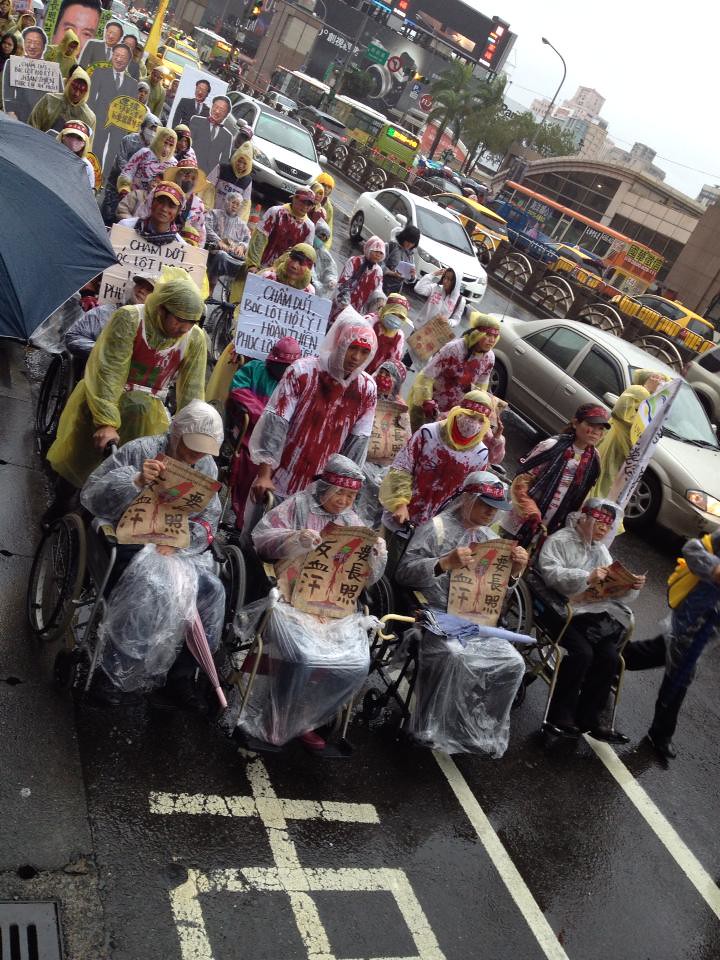 |
| You can see from the photos of politicians at the back how old these pictures are, and yet the same issues remain |
Remember, for many, they work here to earn money to send home. Home. They will stay as long as they need to earn that money, but they don't intend to live out their lives here. Just like us, they have family, friends and connections where they come from.
What's more, I'm not sure what "swamped" is supposed to mean here. Taiwan has a labor shortage, not a surplus (the fact that this has not translated into increased wages is all about fiddling at the top). The birthrate is going down, not up. The average age is going up, not down. The population is set to decline, not rise.
We talk about foreign talent being part of the solution to all of these problems, although I think the bigger solution is to stop the top-level cronyism that leads to artificially depressed wages for locals, and to improve working conditions (and pay) across the board so the brain drain gets plugged. But people seem to assume that including immigration as a solution to Taiwan's economic and labor woes means professional foreign labor - frankly, we also need foreign blue-collar labor. They are consumers too. They sometimes marry locally. Many have children locally. One in five marriages is to a foreigner.
This is good for an aging population, not bad. It's not swamping, it's replenishing. That is, unless you are worried about the racial makeup of your country changing. And why would you be worried about that if this wasn't about race?
In any case, the people who would be eligible are the people who are already here. Nothing would change, really.
I've heard the 'culture' argument too: as more Southeast Asians want to come here than people from other parts of the world, allowing that many (although I disagree it would be so many) of them in would change the cultural makeup of Taiwan. Would it, though? Let's take one cultural marker for example - Islam. Right now the Muslim population of Taiwan is about .03% of the population (Christians are about 4.5%, and I've also heard 5% as a figure). Even if that number grew exponentially, it's still a long way to even 1%. I honestly just don't think it would change that much, even taking into account the fact Taiwan is quite a bit smaller than the US.
Even if that were a legitimate fear, it strikes me as another form of discrimination based on national origin - ethnocentrism, perhaps. We learned in the 20th century that nation states based primarily on ethnicity were a bad idea (I'd double underscore that if I could), so I'm generally wary of this line of thinking.
Another reason seems to be that "more foreign labor hurts Taiwanese labor". I didn't believe this when Bernie Sanders said it about immigration in America (he eventually modulated his message to be anti-corporate exploitation, but his original platform was anti-foreign-labor as a defense of American workers) - and I don't believe it now.
Foreign labor has been coming to the US ever since we've had work for them, and it has never significantly slowed down the US economy. If anything, accepting scores of low-skill workers who eventually assimilate and move up so their children can do better and the whole country can grow more prosperous is what made us what we are.
What's more, we do need people to do that work. Anti-immigration Americans insist that Americans will do it, but I'm not so sure about that. I'm not so sure about it in Taiwan, either: there seems to be a real prejudice against 'black handed' work (that is, work that gets you dirty). As it stands now, in the US, foreign labor pretty much ensures that our agricultural and service sectors run. In Taiwan the industries are different (elder care and factory and fishing work) but the story is essentially the same.
I'm not happy with the exploitation I see in any of those industries, in either country, but the solution isn't to tell foreign labor to stay home, it's to improve the industries to be less exploitative. They want to come, and they do work we need done - don't punish them. Punish the people who victimize them.
Bernie still doesn't seem to have figured this out, and unfortunately Taiwanese who think similarly don't seem to, either.
The most persuasive argument is that foreign labor is so cheap that it undercuts Taiwanese wages.
As for domestic workers, however, I'm not sure this is persuasive enough. Salaries in Taiwan are stagnant, and the population is getting older. People can't afford to pay more to hire someone to care for their elderly family members, but it is difficult-to-impossible to hire a Taiwanese person to do this work at the same rate you would pay a foreign caretaker. If we had a shortage of domestic workers, the work would most likely fall to the women of the household: yet another family obligation that pushes women to scale back on their other goals and ambitions. I can't condone that.
Regarding factory and agriculture/fishing workers, research seems to indicate that the impact is small and short-term if it happens at all, but foreign blue-collar labor is overall a benefit. Remember, without them prices would go up, storefronts that now house shops and restaurants aimed at Southeast Asian immigrants would be empty, the population would drop, certain work would not get done and lower production, even in the short term, would harm the economy. It's not so simple as saying "they can just hire Taiwanese (and pay them more)".
And, frankly, wages in all of these sectors (and all other ones too) need to go up whether the workers are foreign or not. I don't want to see Taiwanese wages drop because of foreign labor. I want to see foreign labor wages increase to rival that of Taiwanese workers, so that industries hire the workers they need, not just the ones they can get at a cut-rate price.
I have tried to talk to friends about this issue, reminding them that I too am a foreign worker. The only thing that differentiates me from them is my skin color and, well, white Western privilege (and the education that comes with it). I remind them that by supporting expanded rights for me, but not for a class that is almost entirely Southeast Asian, that they are essentially rewarding born privilege. Rewarding me for being born Western, with means. At the same time, they are punishing other people for the less fortunate circumstances they were born into.
I know my friends and other pro-Taiwan advocates well enough to know that they aren't intending to be racist. They are just as happy to welcome foreign professionals of any race, including Southeast Asians, and are horrified to hear stories of racism in professional labor (which do exist - ask...well, any given one of my non-white foreign professional friends in Taiwan).
However, it can't help but be about race. The race divide is too clear: most foreign labor in Taiwan is Southeast Asian, most professionals are Western, and most (but not all) of those are white. Although the intention is not to discriminate based on race or skin color, that is essentially what they are doing. It's playing into that same old socioeconomic game: they see it as a line between what helps Taiwan and what they think doesn't, but it is also a color line, whether we like it or not. That color line is a power line: I have the power to gain certain rights and privileges in Taiwan simply because of the circumstances of my birth: the country and family I was born into. There is no universe in which I think this is fair.
Not wanting to consider that the line drawn is, in effect, a color line as much as everyone would like it not to be is a real problem. It's still discrimination. It's still saying "some people deserve more rights than others". It's still saying I deserve something better than a woman from Indonesia because I happen to have been born with more money and in the right country. And if you group people by who is on the 'preferred' side of that color line, of course it's the people who are mostly white. Who, again, is kept down? Non-whites.
Whether you like it or not, that is what it is saying.
But that line is also a poverty line: these views advocate rewarding people who were born in the right place to the right people, and punishing those who weren't. People who want a better life, just like anyone else. People who just want to work hard and make money to better their circumstances. People who do contribute to the Taiwanese economy in invisible ways, whether one wants to admit that or not.
With these attitudes still in place, I'm not sure how the New Southbound Policy will remain on solid footing going forward: Taiwan already has a bad reputation in SE Asia as the worst of all the industrialized Asian countries to move to for work due to low wages, long hours and rampant exploitation. Are these same countries supposed to happily work more closely with Taiwan for mutual benefit in industry, tourism, trade and culture, when Taiwan still doesn't want to give immigrants from those countries in Taiwan more rights? This whole strategy can only work if both sides stand to benefit, not just Taiwan as it weans itself off reliance on China. That means extending rights and benefits to foreign labor from Southeast Asia in Taiwan, not more of the same.
No one is an island, whether you like it or not.
It also bothers me that, as I've talked to so many friends recently about how to talk about Taiwan in a convincing way with American liberals, that I essentially have the same problem in Taiwan: I don't know how to talk to Taiwanese liberals about foreign labor, especially blue collar labor. They seem to have gotten the message regarding foreign professionals and dual nationality - not that that is moving any faster - but cross that color line and I feel like I hit a discursive brick wall. There is a lot of sympathy for ending abusive treatment, but none for giving foreign labor real opportunity in Taiwan.
It's also just a bad look: I know the intent isn't racial discrimination but as that's the practical effect, it's bad optics when it comes to getting foreign support. We are foreigners too. We are, essentially, foreign workers with more privilege and different skin. We do - especially the more liberal among us - feel solidarity with Southeast Asian workers. When a party isn't doing everything they can for some foreigners, all politically astute foreigners notice. If they want more 'New Taiwanese' to support them, loyalty is bred by treating all 'New Taiwanese' well, not just the comparatively privileged ones.
It is quite problematic, as well, that when these issues do finally get discussed, they feel filtered down through layers of acceptability. First, the NPP didn't support changes to regulations regarding foreign professionals. I'm not sure that ever changed, but they did start to support relaxing dual nationality requirements...again, for professionals. The DPP relaxed these requirements, but only for certain professionals. It might be extended to the rest of us plebes someday, but not laborers. Only once that happens does it feel like the conversation might open to include talk of increasing their rights, too. It's like ideas of inclusion in Taiwanese society have to drip down through a layer of white Westernness for them to finally be acceptable to think about also including people who are not as privileged.
The US also has a problem when it comes to how the majority of people view blue-collar immigrant labor, although the liberal landscape is changing enough that Sanders took some heat for his views. It was ultimately not enough for most to abandon him or even reconsider their support. For us, that labor tends to come from Mexico, Central and South America.
It's not much different in Taiwan, the only difference (beyond the origin of the majority of laborers) being that not even the liberal electorate is admonishing the progressives they support for their views on blue-collar immigrant labor.
In both countries there is a power and a poverty line, and in both it is difficult to get certain liberal thinkers to really consider how it is also a color line - but in Taiwan it feels so much harder these days.
I know the progressives of whom I speak, so I know the intention is not to keep certain people considered 'undesirable' based on their race. We cannot ignore that this is the practical effect, however, and if Taiwan doesn't provide better opportunities for Southeast Asians within its borders, then Southeast Asia has less incentive to grow the stronger links with Taiwan that this country needs to weaken China's grip. There are times when the effects of globalization are not positive, but this, I feel, is not one of them.
Let's end with this: not too long ago, one of the strains of Taiwanese public discourse was that it wasn't good enough to just seek independence. That Taiwan has two gauntlets before it - de jure recognition of the independence it already has, and deciding not that it is a country (it very obviously is) but what sort of country it wants to be. At the time this discussion was about marriage equality, and it later evolved to include aboriginal land rights.
I'd like to extend that and say that Taiwan also has to decide what sort of country it wants to be vis-a-vis how it treats its immigrants - all of its immigrants. Not the ones that most obviously benefit the country, but those who benefit the country in less visible ways. Not the ones it is easy to welcome, but the ones you may have to overcome prejudice to welcome. Not the ones who already have the benefits of privilege, but those who don't, so they have the opportunity to do better and, as they raise themselves up, help make your country better as well.
Does Taiwan want to be the sort of country that gives all immigrants rights, or does it want to be the sort that discriminates based on old prejudices about what sort of people are desirable, drawing a line that, as much as we wish it weren't, is a color line?
Tuesday, January 10, 2017
It's not always bad to do something for the media attention
Hoping to keep this short and sweet.
Beyond airport harassment that did leave bruises, in Taipei, pro-unificationists who are almost certainly gangsters or paid thugs also protested outside of the forum, and there was a police presence - the threat was real enough to warrant it.
This isn't the first time activists or their supporters have been physically threatened: it happened during Occupy Central in Hong Kong and I personally witnessed an attempted 'false flag' eruption of fake 'violence' incited by gangsters outside of the Legislative Yuan during the Sunflower Movement (I didn't see much as I was trying more than anything to get out of the way - as a foreigner one really doesn't want to get caught up in that). Again, because whoever has money and is paying them wants to silence voices and cut communications because what they are saying make the rich and powerful uncomfortable.
Honestly, I think it is quite unlikely that there was no communication between the thugs in Hong Kong and the thugs in Taiwan. This is a calculated and long-term strategy in both places, bigger than some one-off angry protesters who don't represent the will of the Taiwanese or Hong Kong residents.
Their methods are too similar, they show up a little too much on cue and their messages echo each other a little too much for their actions to be entirely unrelated. I also think it is quite unlikely that the Chinese government isn't lurking at the back somewhere like a twisted wizard or marionette master, basically taking their online troll offensive to the streets with real-life trolls.
Or at least, that's my crazy opinion.
The only way to counteract this is to refuse to give in. Maybe this forum did just exist for the media attention, but the fact that a bunch of gangsters and thugs showed up to cause trouble in both Taipei and Hong Kong shows that that attention is more important than ever, and as such, is not necessarily a mark against the event.
The Hong Kong activist/New Power Party forum held in Taiwan over the weekend is starting to make the international news. Not because of the forum itself - nobody really writes about that stuff for an international audience - but because two of the attendees from Hong Kong, legislator Nathan Law and Demosisto chair and activist (and person who is way more together than most 20-year-olds) Joshua Wong were heckled, threatened and even attacked both at Taoyuan airport in Taipei, and in Hong Kong.
Why? Because certain groups would rather that activists and other voices in society - any voice that doesn't tow the Beijing / KMT / gangster / possibly rich business asshole (in Taiwan these are all somewhat related) line - to shut up. They want to make it seem as though there is more division than there is in both Hong Kong and Taiwanese society, potentially find excuses to call activists "violent" (when they are the ones inciting the violence) and help limit contact between the two sides.
Now, I've heard a few "criticisms" that the forum was more about meeting up, showing solidarity, and perhaps the media and PR attention that comes from pro-self-determination groups in Taiwan and Hong Kong meeting (and what it says that they can't do so in Hong Kong). More so than it was about actually getting important work done. Or as New Bloom called it, "skill sharing".
It certainly made for some good photo ops - though I have to note that with so many men and so few women the photos do make the various movements seem like boys' clubs, something I doubt the leaders in them want - and did show that while there may not be quite as many street protests these days, the movement is still there and the people involved in it are not going away.
Why? Because certain groups would rather that activists and other voices in society - any voice that doesn't tow the Beijing / KMT / gangster / possibly rich business asshole (in Taiwan these are all somewhat related) line - to shut up. They want to make it seem as though there is more division than there is in both Hong Kong and Taiwanese society, potentially find excuses to call activists "violent" (when they are the ones inciting the violence) and help limit contact between the two sides.
Now, I've heard a few "criticisms" that the forum was more about meeting up, showing solidarity, and perhaps the media and PR attention that comes from pro-self-determination groups in Taiwan and Hong Kong meeting (and what it says that they can't do so in Hong Kong). More so than it was about actually getting important work done. Or as New Bloom called it, "skill sharing".
It certainly made for some good photo ops - though I have to note that with so many men and so few women the photos do make the various movements seem like boys' clubs, something I doubt the leaders in them want - and did show that while there may not be quite as many street protests these days, the movement is still there and the people involved in it are not going away.
So, sure. There's a lot of truth to the idea that this was more about media attention and basically just getting together to talk rather than actually getting hands proverbially dirty in the field.
I would defend it, however, saying that sort of PR is necessary - it's a public show of solidarity and sends an important message even if it had no broader effect beyond that. So, I think it was worthwhile.
Or as a friend put it, "'They're just doing it for the media attention' is conservative speak for 'STFU'." And he's right - media attention has a purpose, and in fact getting coverage or just showing there is still a force behind a movement is essential in a democracy.
I would defend it, however, saying that sort of PR is necessary - it's a public show of solidarity and sends an important message even if it had no broader effect beyond that. So, I think it was worthwhile.
Or as a friend put it, "'They're just doing it for the media attention' is conservative speak for 'STFU'." And he's right - media attention has a purpose, and in fact getting coverage or just showing there is still a force behind a movement is essential in a democracy.
Beyond airport harassment that did leave bruises, in Taipei, pro-unificationists who are almost certainly gangsters or paid thugs also protested outside of the forum, and there was a police presence - the threat was real enough to warrant it.
This isn't the first time activists or their supporters have been physically threatened: it happened during Occupy Central in Hong Kong and I personally witnessed an attempted 'false flag' eruption of fake 'violence' incited by gangsters outside of the Legislative Yuan during the Sunflower Movement (I didn't see much as I was trying more than anything to get out of the way - as a foreigner one really doesn't want to get caught up in that). Again, because whoever has money and is paying them wants to silence voices and cut communications because what they are saying make the rich and powerful uncomfortable.
Honestly, I think it is quite unlikely that there was no communication between the thugs in Hong Kong and the thugs in Taiwan. This is a calculated and long-term strategy in both places, bigger than some one-off angry protesters who don't represent the will of the Taiwanese or Hong Kong residents.
Their methods are too similar, they show up a little too much on cue and their messages echo each other a little too much for their actions to be entirely unrelated. I also think it is quite unlikely that the Chinese government isn't lurking at the back somewhere like a twisted wizard or marionette master, basically taking their online troll offensive to the streets with real-life trolls.
Or at least, that's my crazy opinion.
The only way to counteract this is to refuse to give in. Maybe this forum did just exist for the media attention, but the fact that a bunch of gangsters and thugs showed up to cause trouble in both Taipei and Hong Kong shows that that attention is more important than ever, and as such, is not necessarily a mark against the event.
Sunday, December 11, 2016
Reader, I cried.
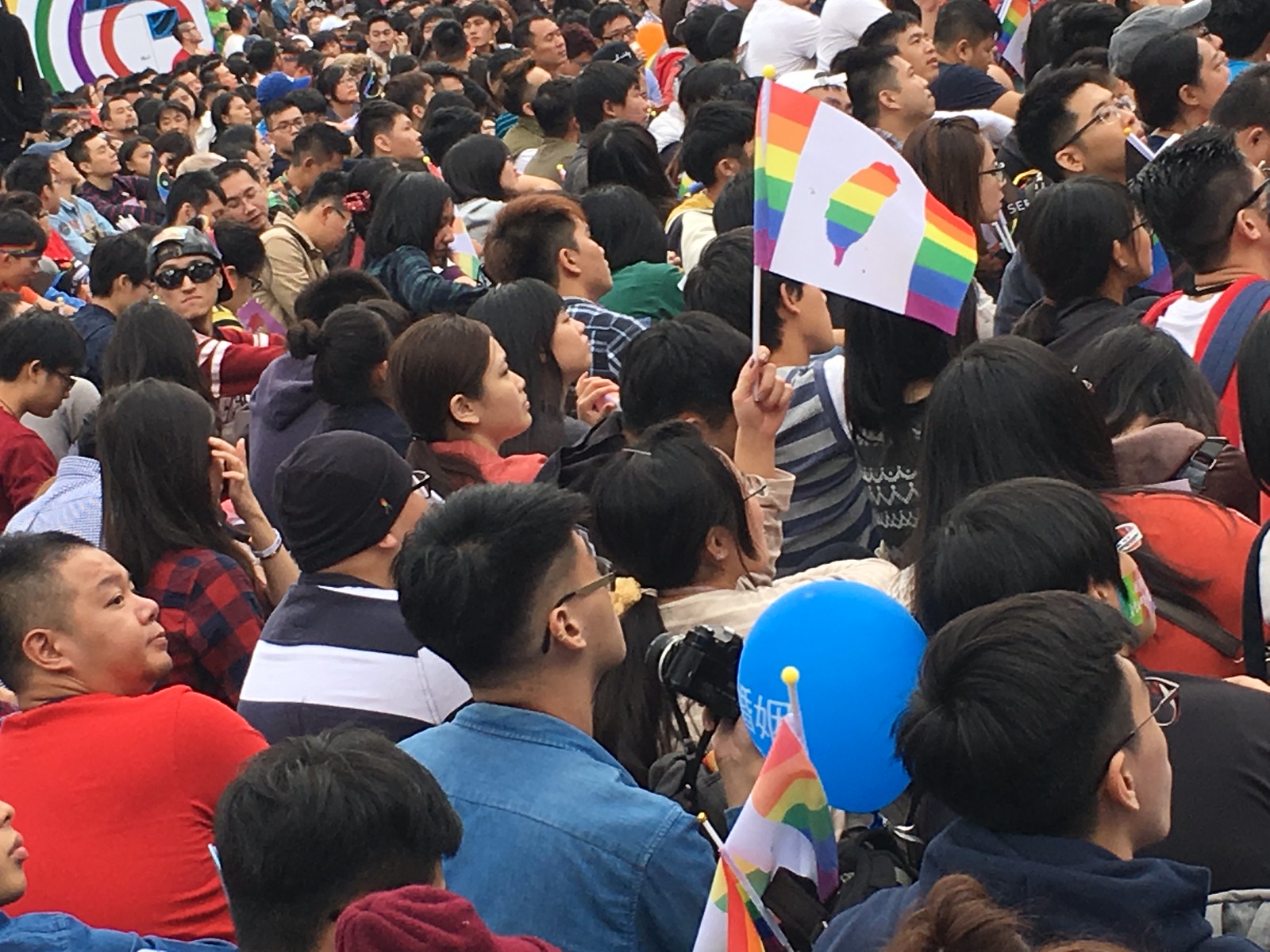
There are plenty of articles out there on the nuts and bolts of today's marriage equality rally: estimates are that 250,000 attended (and also that the "200,000" number quoted for the anti-equality rally was misleading: that was the total for every event across the country, not the demonstration downtown, which was more like 100,000 it seems). I personally feel, based on no scientific principles whatsoever, that it was more. I was at the protest against the military after Hong Zhongqiu's death - I remember estimates of 200,000 - this was more. I was at the Sunflowers, which was reported as 100,000 (but was well-known to be more like 400,000). This sure felt like more.
At that protest, we were able to walk up to the Jingfu Gate and more or less walk around - this time it was impossible to do that (we ended up seated near it only because we showed up on the early side). When I walked back to NTU Hospital to use the bathroom, I looked down Zhongshan Road away from the center of the rally, towards Zhongxiao - and I'm telling you, I could not see the end. It just kept going.
Edited to add: I've somewhat changed my mind on this after seeing the aerial photos. During the Sunflowers Xinyi Road was backed up to about a quarter of the way down the side of CKS and there were crowds in front of CKS as well. That was not the case this time - the center was more crowded but Xinyi and the area right in front of CKS were perhaps less so.
I'm not sure it matters, though, and don't take my word for it. If the anti-equality crowd was about 100,000 in Taipei, and we hit 250,000, we dwarfed them.
And yes, it matters.
They'll tell you that most attendees were young - this is true, though I did see some aunties and uncles and a few grandparental older folks around.
They'll tell you the numbers decisively outclassed the Bigot Rally last weekend.
They'll tell you that people from all major political parties spoke - the DPP, the NPP and Jason Hsu of the KMT (who, as KMT folks go, is not a bad dude. Perhaps delusional about his own party, but otherwise he's basically okay).
They will also tell you that Taiwan is poised to be the first country in Asia to legalize marriage equality, and that the final reading of the bill (there are three in question but the attendees today specifically support the one that would amend the language of the Civil Code rather than be appended to it, and certainly not a third bill proposing civil partnerships) is the day after Christmas.
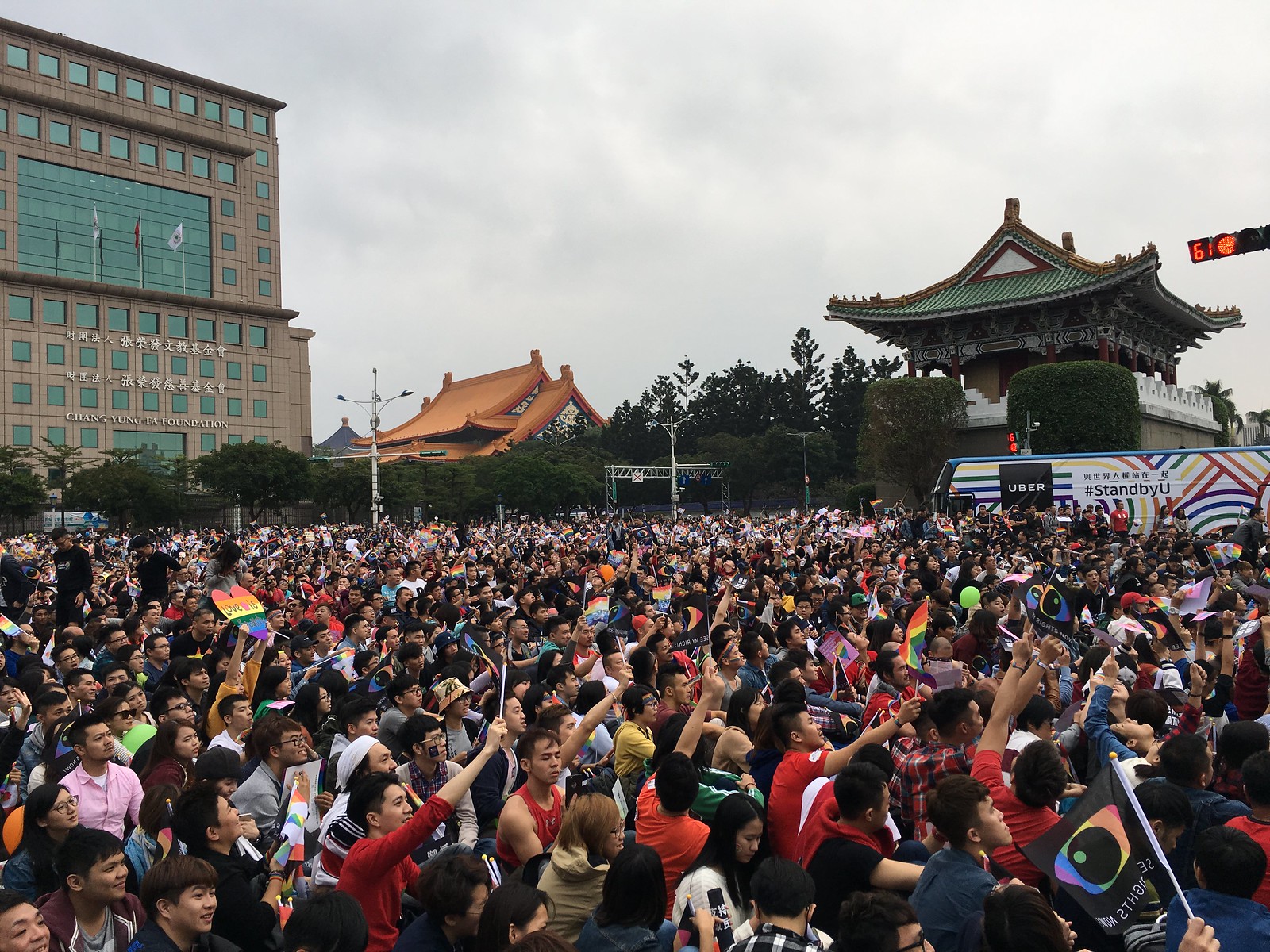
That's all necessary information, but it's all already available, so I wanted to offer perhaps a more emotional reaction to this event.
This never had to be my fight. I'm straight and married. I could have easily stayed home and said it really wasn't my issue. It doesn't affect me directly (but, through my friends, it does affect me in a way). I came out because it was the right thing to do. If there's one thing my mom, who will have passed away 2 years ago this Monday, taught me, it's that you do things because they're the right thing to do, even if they don't have to be your fight. My mom was an activist and involved person in her community, as well as a big-hearted, generous and liberal person. I felt like I was carrying a touch of her spirit with me - at least if I believed in spirits, which I don't - by attending an event to support equal rights simply because it is the right thing to do, and for no other reason.
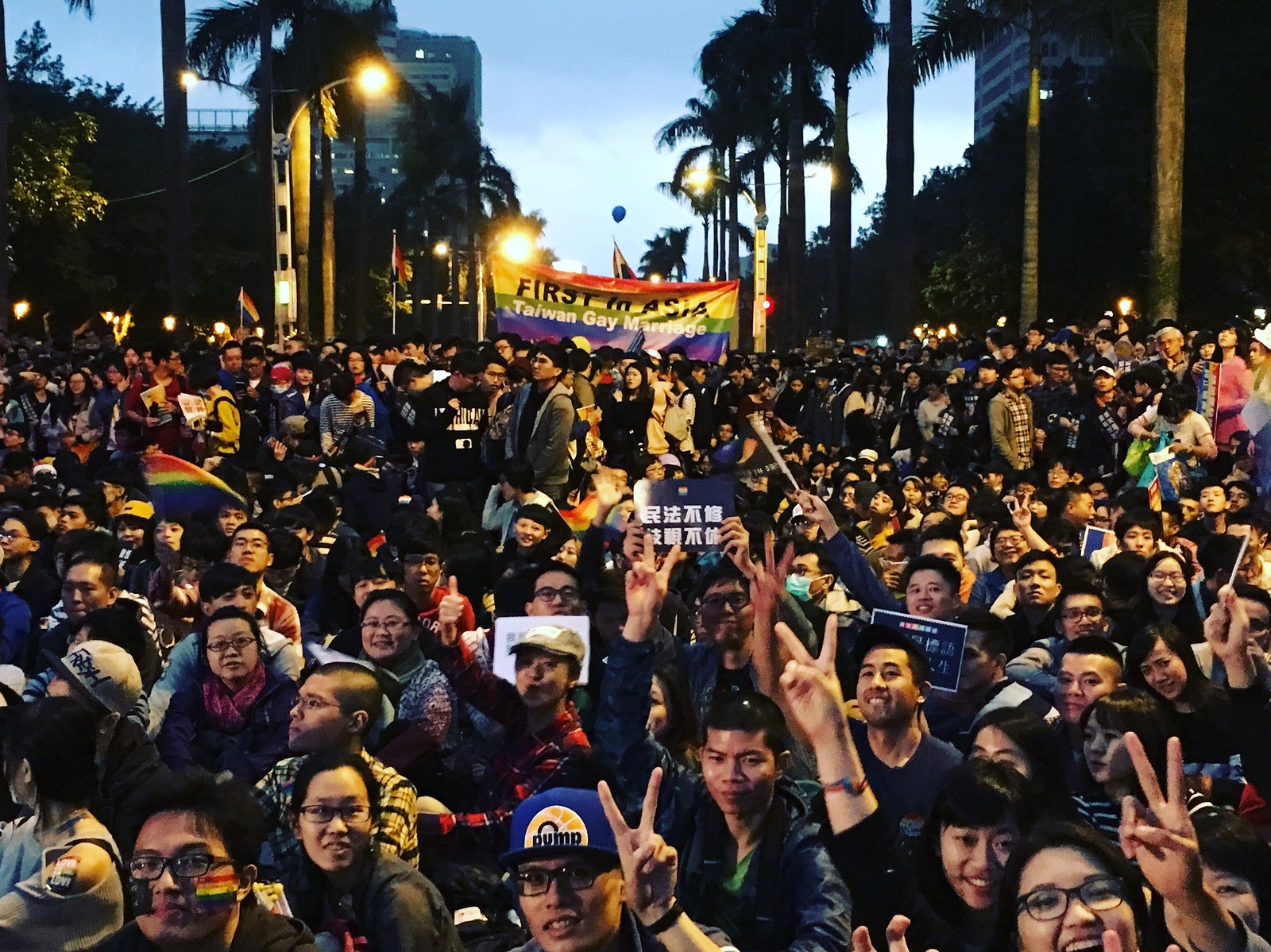
I've heard from others, too, that they had 'cry moments', or were getting misty-eyed. For a lot of people, it must have been really wonderfully overwhelming to see that their fellow citizens do, in fact, support them. Others were just blown away by the love, inclusiveness and camaraderie. I had mine too.
I have to say as I exited NTU Hospital MRT station and saw, before the event's start time of 1pm, that it was already packed, I had my first emotional reaction. This is really happening, I thought. Enough people are going to come out to support equality. We're really going to do this.
As I met my friends and we walked toward Ketagalan Boulevard, I misted up again several times - just watching how big it was, how many people felt that not only should they quietly support marriage equality, but that they needed to come out in person to show the legislature how popular the idea really is.
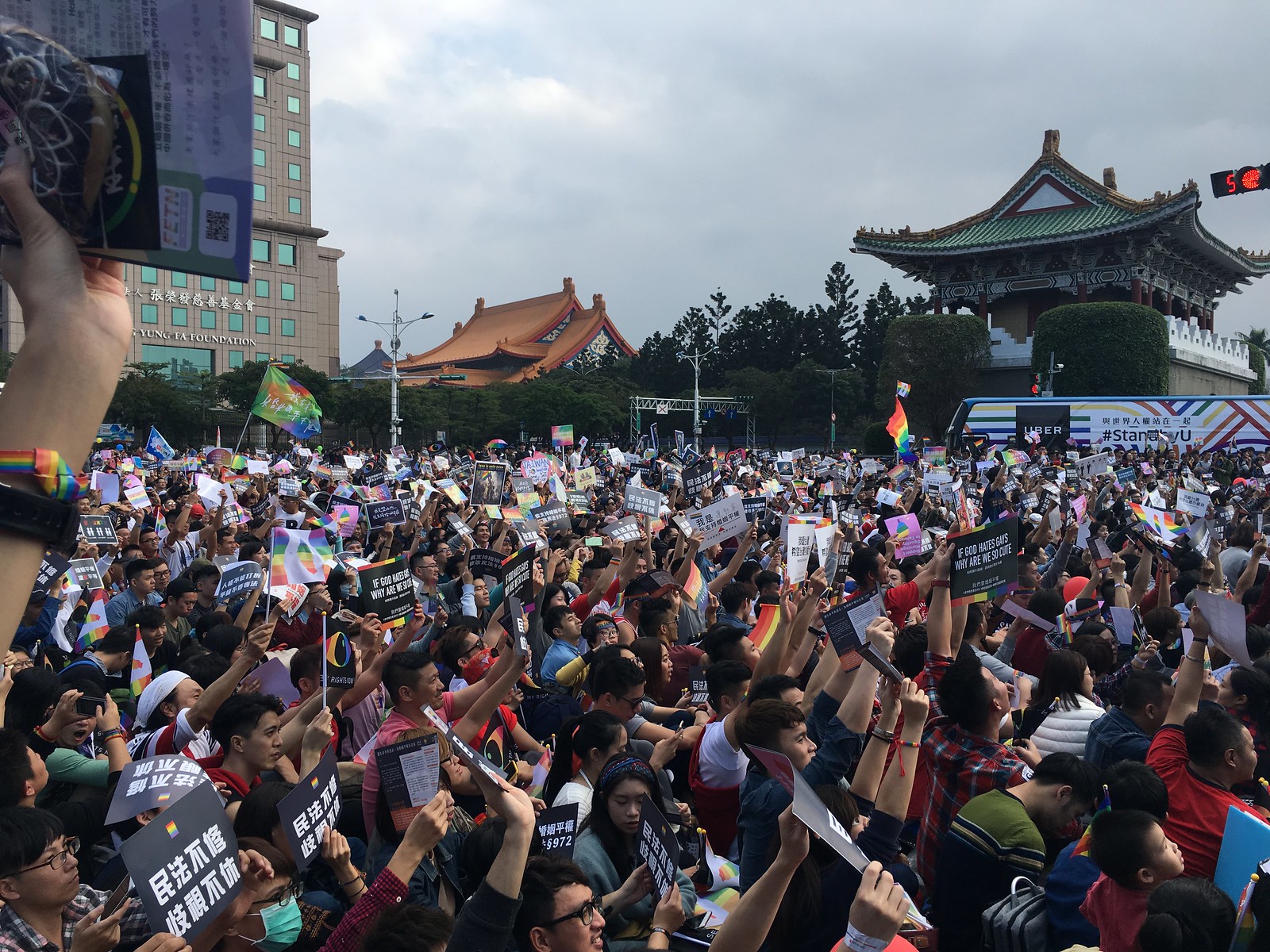
I've said it before, but it bears repeating. Often when I visit the US, I am asked about Taiwan with this assumption that it is a conservative country (if people asking can differentiate it from China or Thailand in any case). It's in Asia, which Westerners often associate with 'conservative'. It continues many traditions that have died out in China - which is not to say that Chinese culture is "preserved" in Taiwan as many like to claim, rather, these cultural elements have evolved to be uniquely Taiwanese - and religious practice has very deep and traditional roots here. There is no concept of the existence of a young Taiwanese Left (or of a society that simply is not that conservative), or that that left might have some striking similarities to the American Left. To this end, imagine my frustration when trying to explain something like the fight for marriage equality or even the Sunflowers to someone who has no concept of these movements in a non-Western context, or rather no room for them in their preconceived notions of what any given Asian country is like.
Even when I try to show, based on real evidence (poll numbers, social issues, civic activism), that there is a vibrant and popular Taiwanese Left that can now be said to outnumber the right, it's been dismissed because it doesn't fit their concept of a 'traditional Asian society'. Liberal causes can't be that popular, it's a traditional society. It can't be that progressive, it's Asia after all.
I've heard this from a few expats in Taiwan who are opposed to equality (they do exist - I've come across at least three of them) - that foreigners in Taiwan are trying to force ideas onto a culture that is different from their own, against the wishes of the Taiwanese. No attention paid, it seems, to polls which consistently show majority support for marriage equality.
I hear this from Taiwanese who are opposed to change as well. It's not our culture, please respect our cultural differences, Taiwan is more conservative.
Except, obviously, it's not. A quarter of a million Taiwanese would not have come out to support marriage equality, decisively crushing the numbers that came out to stand for reactionary ideals and anti-equality, if equality were not an integral part of Taiwanese culture. The fact that so many people were there at all speaks for itself - QED.
So coming out today and seeing hard evidence, by the numbers, that in fact equal rights is important to the people of Taiwan, liberal causes are popular, and people will show up made me a bit misty-eyed. I wasn't just trying to twist reality to fit my worldview - this is real. The enthusiasm is real. You could feel it - it wasn't angry, tight-lipped, prayerful, admonishing or dismissive (and outright threatening to outsiders, including journalists) in the way that the anti-equality rallies have been - it was warm, open, loving, and welcoming.
But what really got me was textual evidence of all of this:
I'm not going to lie - I am really happy I was not with my friends when I saw this. Something about this sign struck me like an arrow - I love the reclaiming of identity as people begin to call themselves "Formosan" to distance themselves from the "Chinese Provincial" sound that has unfortunately come to be associated with the name "Taiwan" for some. I love the historical callbacks not only to the Portuguese name, from a time before Chinese meddling (and a great deal of Chinese emigration), but to the short-lived and unrecognized Republic of Formosa and - at least in Chinese - to the Kaohsiung Incident. It was striking if you stopped to think about it, truly.
It could have been that, or perhaps the plainspoken sincerity and full-throated civic engagement in the semantics of "respect for basic human rights" and "We the people".
Or it could have just been that I'd been there all day, feeling all the feels and this sign was the spark that lit the underbrush.
At the time, I had been thinking about how the anti-equality church groups mobilized their people by getting congregations to go together: it was very much a group effort done through networks. Individuals may have chosen not to attend - and I have Taiwanese Christian friends who never would have attended an anti-equality event - but it's easier to be pulled into going when your entire congregation goes. I considered that, and how such mobilization brought them about 200,000 in total (100,000 of which were in Taipei). I compared that, then, to how so many people who came to stand up for what is right did so of their own accord. Perhaps friends influenced friends, and the LGBT and activist networks were buzzing - Facebook was on fire in the days leading up to it, but then my Facebook feed wouldn't have had any of the anti-equality buzz - but in the end, it didn't take congregations grouping together to get the most numbers. It took lots of people who, on their own, decided they needed to physically show up and put their bodies on the street to show the government what is right. We didn't have church networks, but we crushed them, decisively, simply because it was the right thing to do. That was what was going through my mind.
Either way, I walked by this particular placard and I won't lie. Little tears - the good kind - started pricking at my eyes and a few ran down my cheeks. It wasn't quite an ugly cry, but had you looked, you would have noticed.
All in a good way, but odd for someone who does not cry very often, and almost never does so in public.

It's also worth pointing out that Pride, which attracted about 80,000 people, was very foreigner-heavy (though the majority was still Taiwanese). This was not - there were non-citizens there like me, but we were specks in a crowd. It needs to be this way, I think: Taiwan needed to show that the Taiwanese, and not foreign influence, were the driving force behind the push for equality.
That said, I do think it's important, if you're into this sort of thing, to attend rallies and protests for causes you care about as a resident. We have, by law, the right of assembly. It is one of the only rights to participate in the process that we are granted, even if we consider Taiwan to be our permanent home. So, we can and should take advantage of it. However, had this been a very foreigner-heavy event, the opposition could have easily used that to their advantage, pegging marriage equality as a 'foreign issue'.
Today, we showed the world that this is very much a Formosan issue.
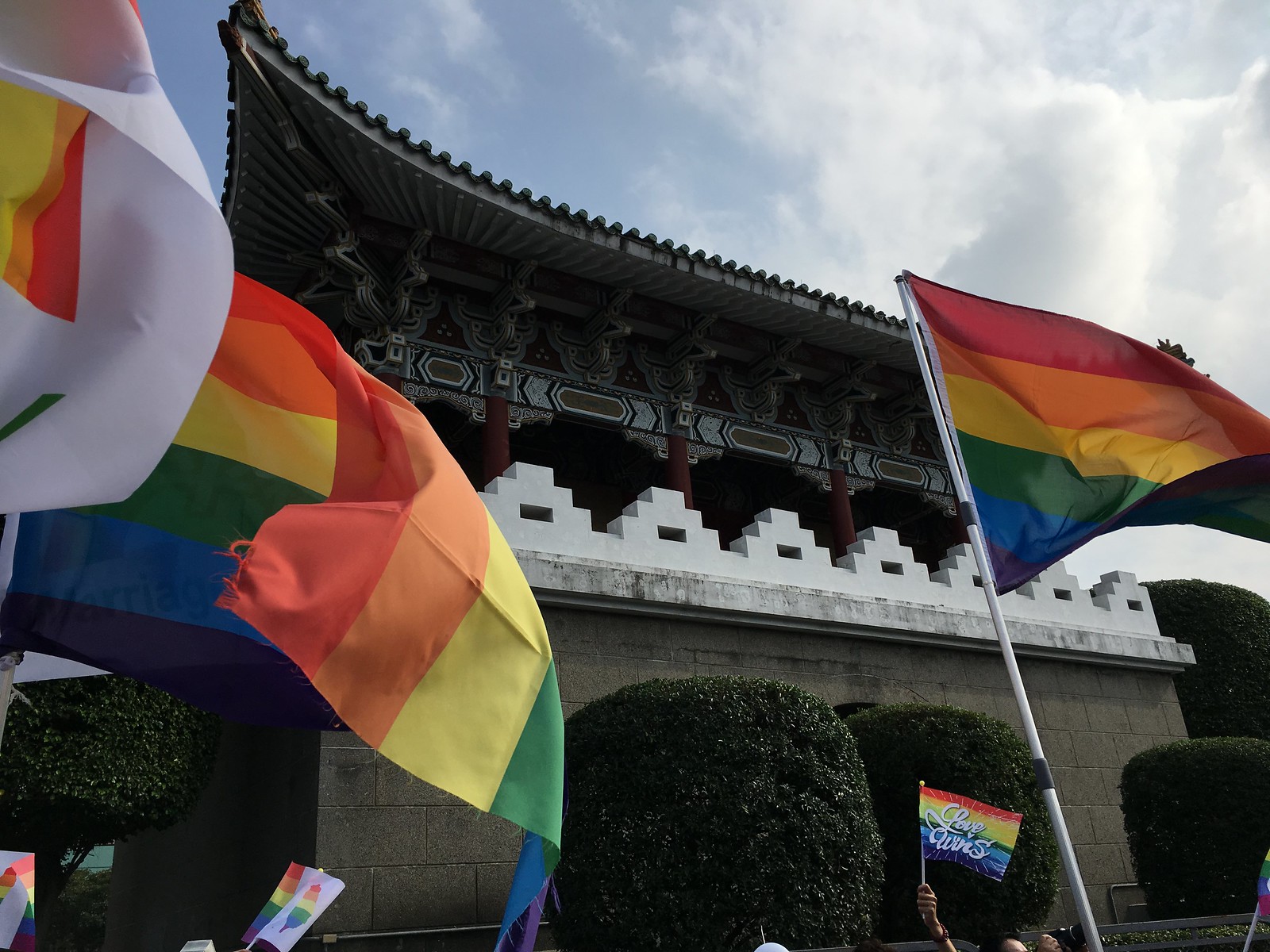
I think this video really says it all. If you want to cry too, go ahead and watch it. I appear at some point, a clip from the longer video I linked to on Thursday night. I said something like, Taiwan is a place that accepts all kinds of people. [The Taiwanese spirit] is a spirit of freedom. It's a spirit of equal rights.
And that's really it - Taiwan proved today that this is exactly the case. The Taiwanese spirit is not one of discrimination, separation, dogma, inequality or exclusion. The Taiwanese spirit is the spirit of democracy and acceptance of different backgrounds, people and lifestyles (whether they are chosen or biologically wired).
This is why I am confident that the Taiwanese will push their elected legislature - which serves the people, not the churches that represent less than 5% of the people - to do the right thing on December 26th.
Because it is simply the right thing to do.
In the end, perhaps that's what brought on the tears for so many of us.
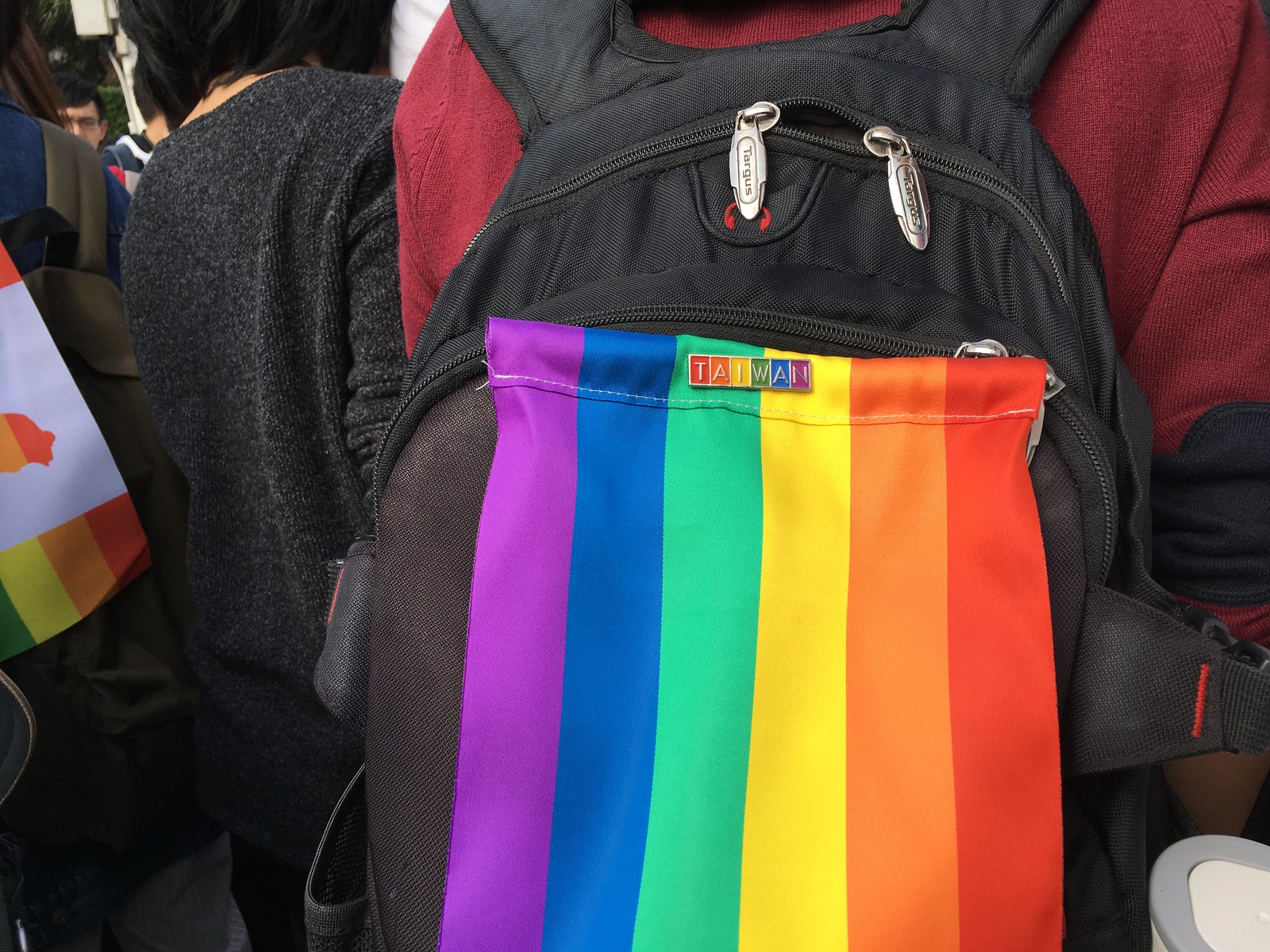
What can I say - we did good. Taiwan did good. We made it right after all of those anti-equality protests, and showed them, the legislature, President Tsai and the world what Taiwan is really about. It was inspiring.
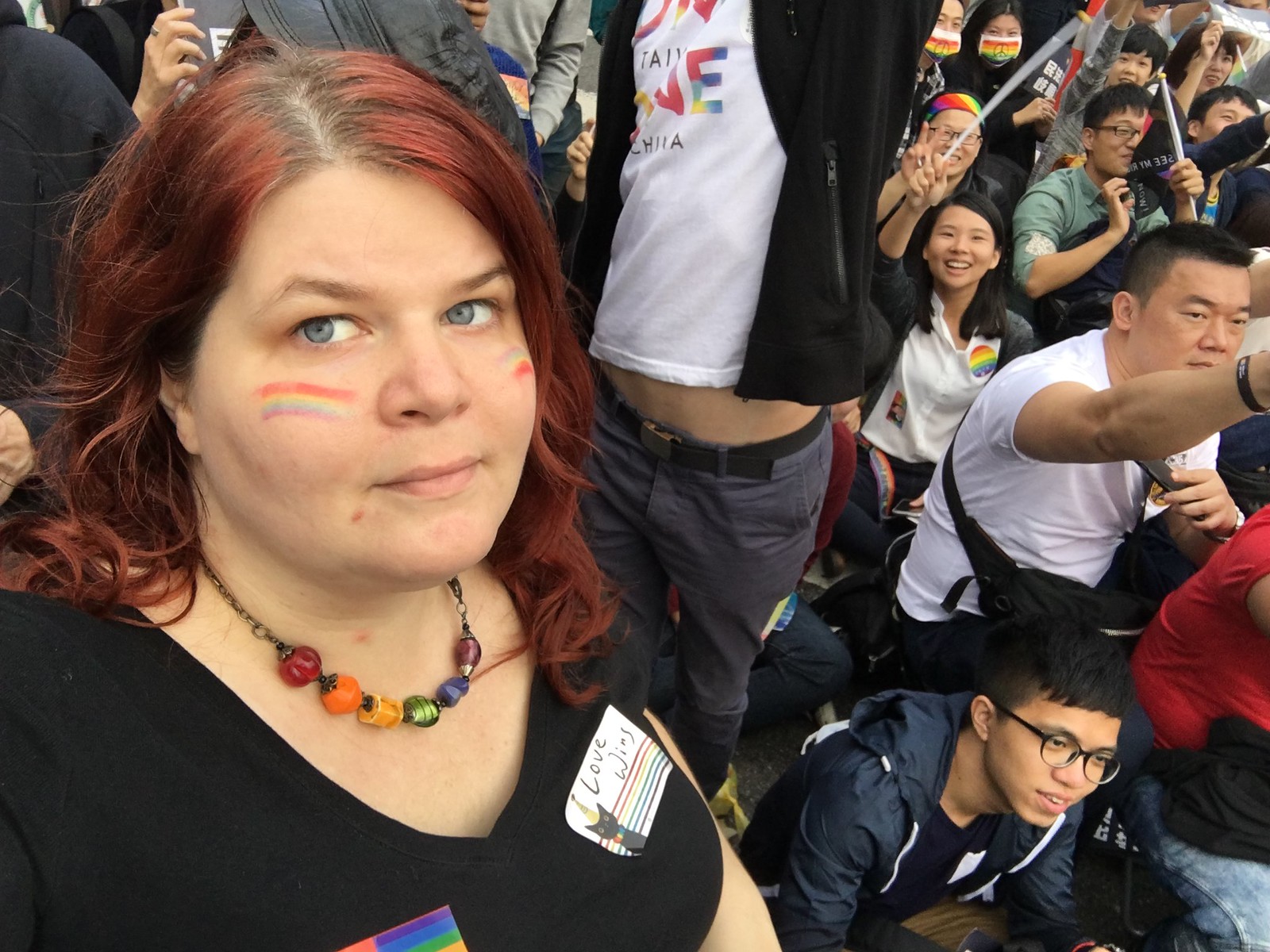 |
| I only just now realized that I totally got photobombed. Can you see it? |
Anyway, enjoy some pictures:
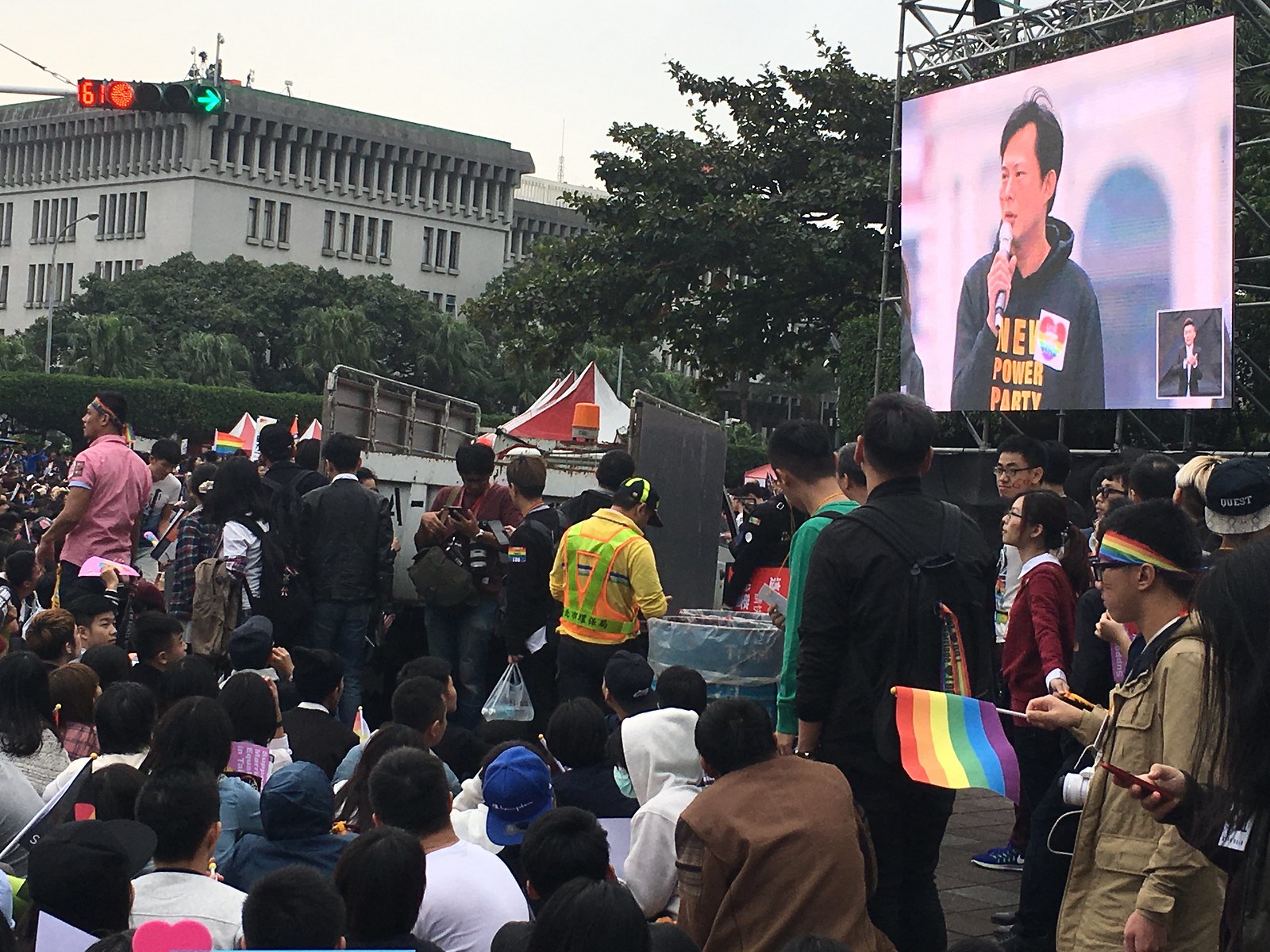 |
| NPP Legislator and former Sunflower leader Huang Guo-chang speaks |
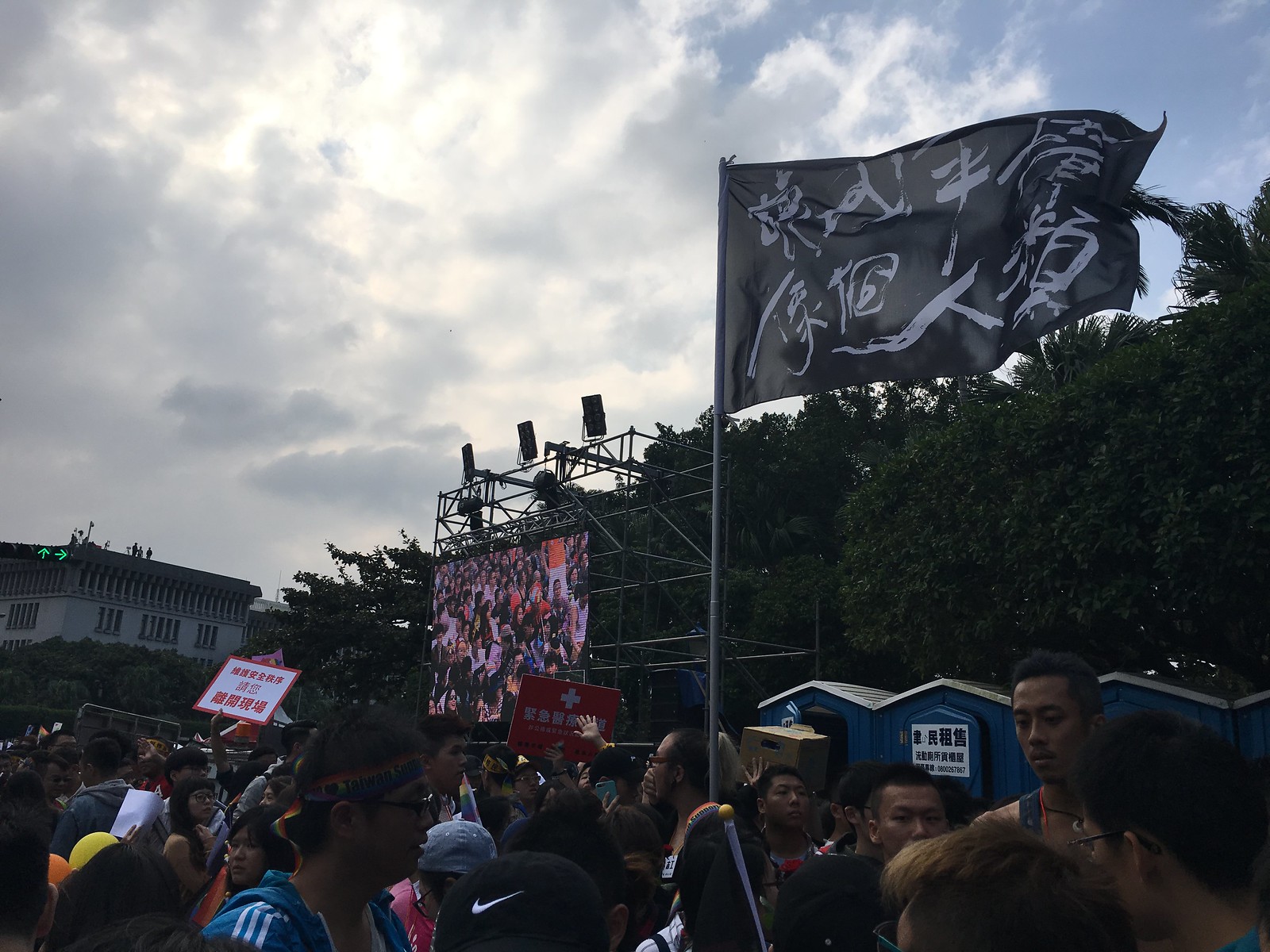
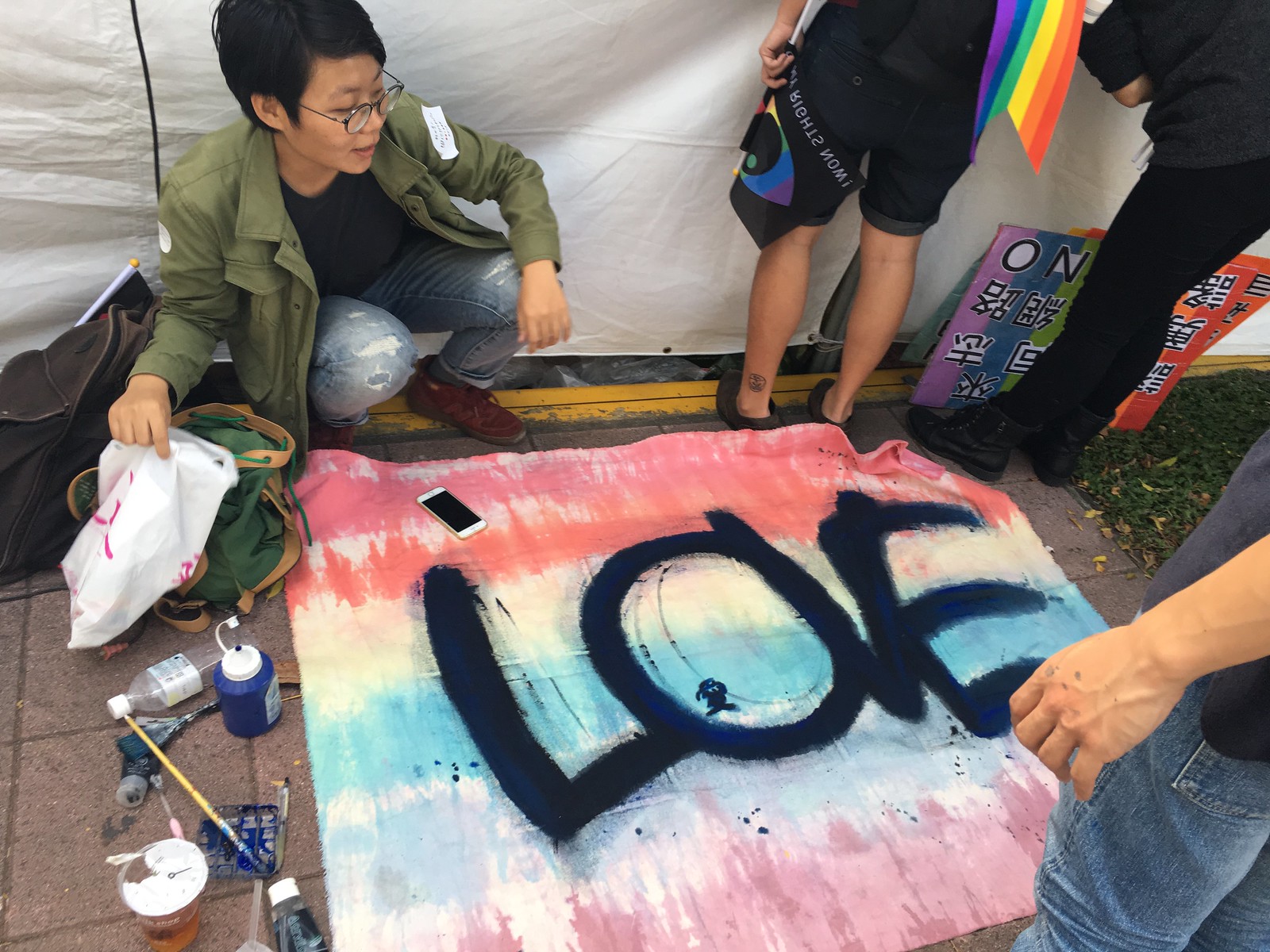
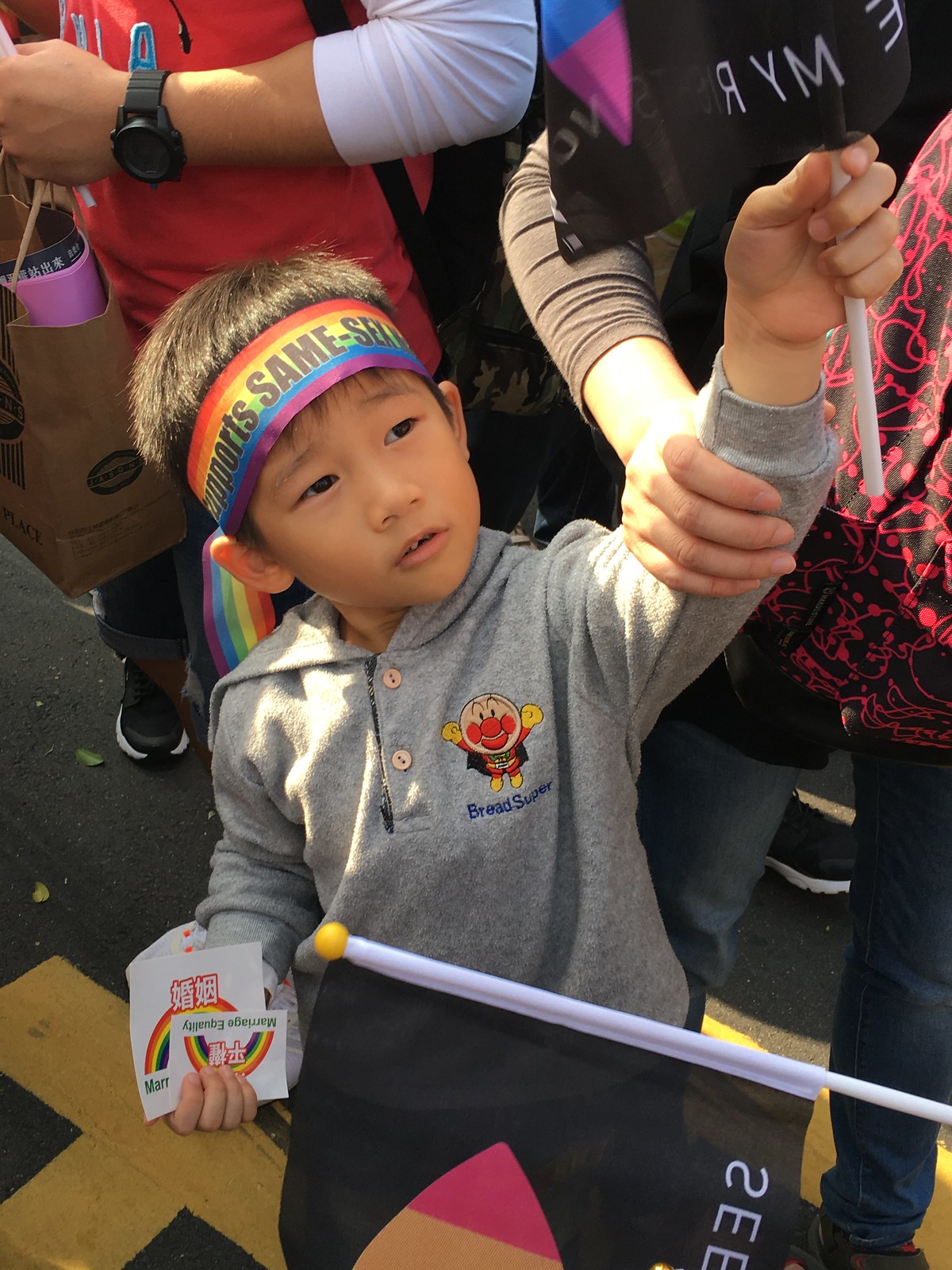
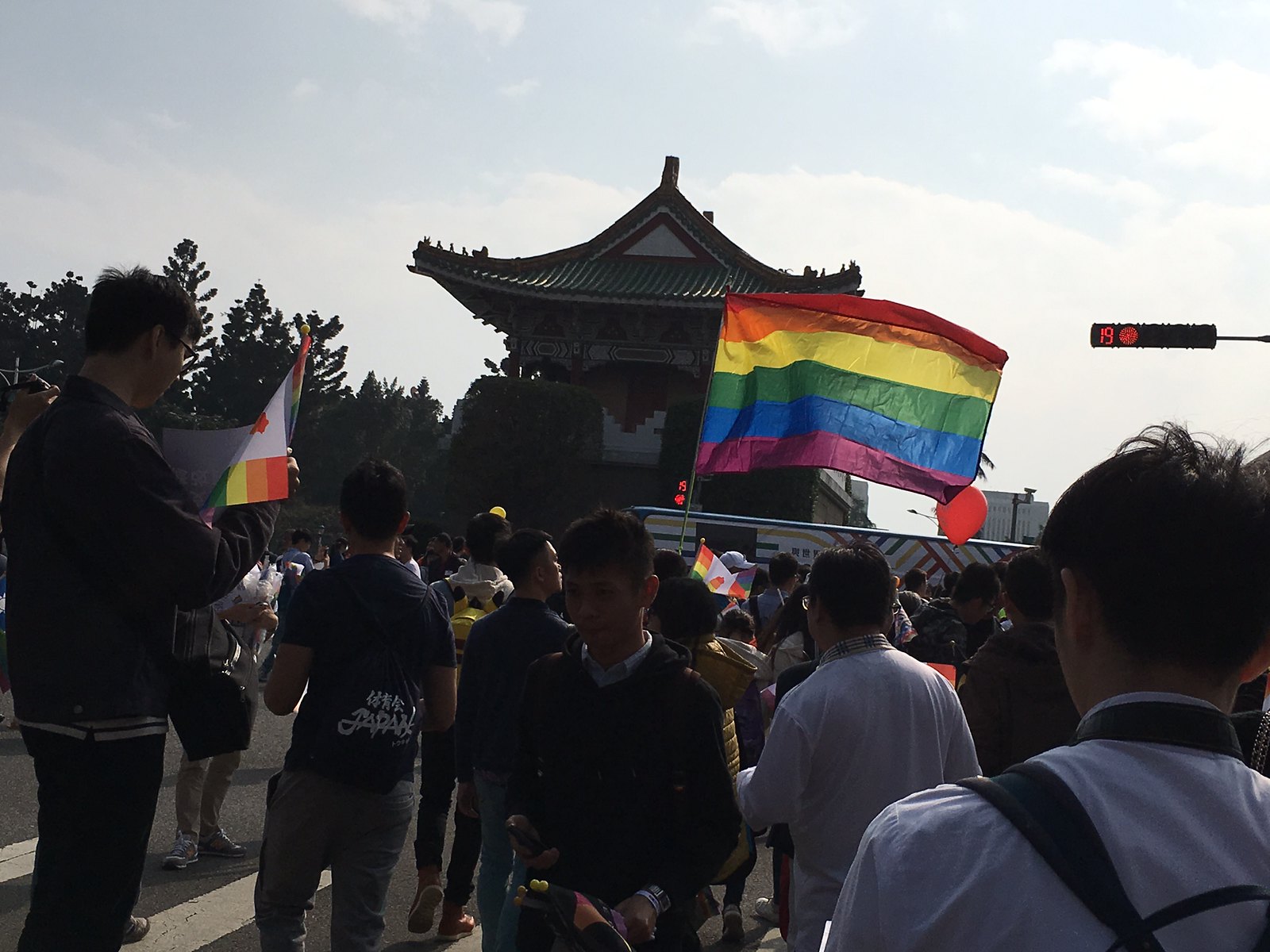
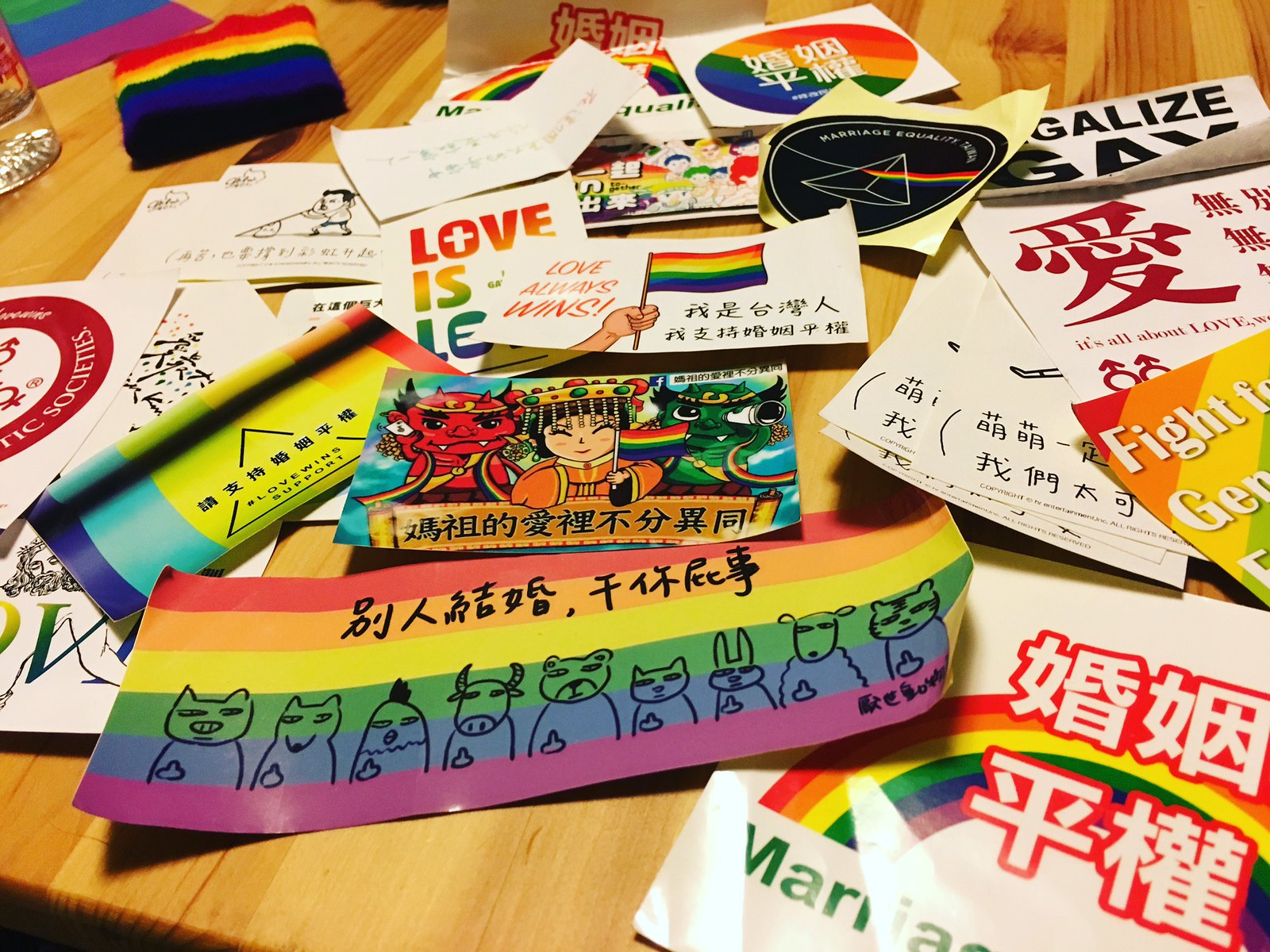 |
| Of course, the best thing about rallies and protests in Taiwan is the haul of fun stickers. The West has obviously not figured this out. |
Monday, June 27, 2016
Brexit Barfing: Both Taiwan and the UK need to stop fearing immigrants
Though
I haven't read of anyone quite doing this yet, I imagine in the days to come
someone will publish some thinkpiece drawing comparisons between Brexit and
Taiwan's fight for de jure sovereignty. Certainly people commented that China
watched the Scottish independence vote very closely, so I imagine they will
also have watched the Brexit vote not only for economic reasons but political
ones, too. Frankly, I'm surprised that China's state media wank-factory hasn't
excreted some steaming turd of churlish nonsense that reads, in short,
"see, Brits voted for Brexit and look at the turmoil that is causing!
Imagine what would happen if we let Taiwan be recognized for what it already
is! That can't happen! DOOM! GLOOM! ZOMBIES! Also you can never understand our 5,000,000,000,000,000
years of culture and that hurts the feelings of the Chinese people".
(I'd
like to say my narrative above is outdated, but unfortunately, it's not. Or
rather, fortunately it’s not - it's so simple to tear apart. China makes my
hobby easy).
So, I
just want to beat that hypothetical pundit to the punch and say that while
there are philosophical relationships between Taiwan and Brexit, they actually
have nothing to do with voting to break from a larger political bloc.
First,
why they are different:
The
people of Taiwan are currently fighting for international recognition of what
almost every Taiwanese person already takes as fact: that Taiwan is inalienably
sovereign and independent. This question has been so settled in Taiwanese
society, to rip off Michael Turton, that the populace has already moved beyond
existential questions of national identity and toward making the nation they
have a better place. Nobody thinks that the UK isn't sovereign, nobody refuses
to recognize it as the nation (or group of nations, whatever) that it is. The
EU isn’t a big authoritarian regime across the English channel that openly
strategizes how to force the UK to join its fold.
The
UK agreed to enter the European Union. Taiwan never agreed to be ruled by China
(or any other colonial power, including the ROC). When British people say they
"took back Britain" I have to ask - from whom? Nobody invaded you,
nobody claimed you as their territory. The EU didn't insist you must be annexed
because you have been a part of their territory 'since antiquity' as China
ridiculously does. You agreed to something and now you don't, so you voted on
it. That's all. "We fought for our sovereignty" - no, you didn't,
because you never lost it. In order to have the vote in the first place you had
to have had sovereignty. They are simply not the same.
What
Taiwan is fighting for is recognition of their entire nation from a horrid dictatorship that has clear, acknowledged designs on annexation. The UK seems
to be pissed off about a few regulations, the downsides of which I have not heard
articulated well, or at all, and an inchoate fear of “immigrants”.
Not
the same. Do not compare them. Don't give in to the false narrative that
Britain won back 'sovereignty' that it had never lost.
Instead,
compare them in terms of how the people view their national identity, and the
lessons that may be learned from putting too much stock in national identity
along ethnic lines, and in terms of understanding how foreign workers impact a
nation's economy.
All the talk about “we don’t want foreign bodies we didn’t elect setting laws and regulations in our country”...fine, sure. I may wonder what laws they have set or what regulations they have imposed that are so terrible that the UK no longer has faith in its own agreement to join the EU, but I can understand the sentiment at least.
But the talk about immigrants? That’s nonsense, and it has parallels in Taiwan. By the logic of Brexit voters, immigrants are a problem – they are taking away jobs and tanking the economy. They are a threat, somehow, to cohesive British culture.
Nevermind that there is little proof that immigrants – workers or students – hurt economies in deep, far-reaching or permanent ways (there is bound to be a little turmoil but nothing that outweighs the benefits of attracting diverse foreign talent), and plenty of proof that they do not have a net negative impact. All of the “Eastern Europeans” Brexiters are clamoring against are not the reason why their economy is in the tank, just as Latino immigrants are not the reason why the American economy hasn’t truly recovered from 2008.
All the talk about “we don’t want foreign bodies we didn’t elect setting laws and regulations in our country”...fine, sure. I may wonder what laws they have set or what regulations they have imposed that are so terrible that the UK no longer has faith in its own agreement to join the EU, but I can understand the sentiment at least.
But the talk about immigrants? That’s nonsense, and it has parallels in Taiwan. By the logic of Brexit voters, immigrants are a problem – they are taking away jobs and tanking the economy. They are a threat, somehow, to cohesive British culture.
Nevermind that there is little proof that immigrants – workers or students – hurt economies in deep, far-reaching or permanent ways (there is bound to be a little turmoil but nothing that outweighs the benefits of attracting diverse foreign talent), and plenty of proof that they do not have a net negative impact. All of the “Eastern Europeans” Brexiters are clamoring against are not the reason why their economy is in the tank, just as Latino immigrants are not the reason why the American economy hasn’t truly recovered from 2008.
Of course, the real problems are the wealthy business owners who continue to pay poverty wages and exploit workers, thinking of their own wealth only (which I can understand, but why are they given free reign when they don’t care about contributing to the economy and country that helped them get rich in the first place? What good are they doing that they should be allowed to continue?), and the relentless attacks on social assistance programs that could actually help the unemployed and poor get on their feet – and in Taiwan, a complete disregard for the idea of personal property by developers and politicians who are in their pocket.
As I’ve written before, it was never immigrants – we are fighting for the samecrumbs of one cookie with locals, while corporate interests have taken the restof the batch. Go after them, not us. We are not the problem.
You can see the same sort of anti-foreign-labor sentiment that drove much of the Brexit vote in Taiwan as well. It is apparent in mistreatment and prejudice against foreign workers – both domestic helpers and factory workers but also, at times, of professionals and English teachers.
By the logic of Brexiters who think, among other things, that “immigrants” are the problem, an immigrant like me in Taiwan could contribute nothing positive to this country. According to that train of thought, the best I could hope for would be to not leech too much off of another country, and I could never hope to be a part of it, do something good for it, be an overall advantage rather than disadvantage to have around, or even fully assimilate. Note that a lot of Brexiters say immigrants ‘don’t assimilate’ into British society, but when that is proven wrong with examples that they do in fact assimilate, those same immigrants are the target of harassment and insult. The same can be true in Taiwan – if foreigners don’t assimilate, they are held up as examples of why “IMMIGRANTS BAD, THIS IS OUR CULTURE”. When they do, they may be told they are not and can never be Taiwanese, or simply not treated as locals, ever, despite their best efforts.
It can be seen in the lack of enforcement of labor laws in the English teaching industry, fishing industry, many factories, many households that employ domestic laborers, and the brokers who bring all but the English teachers here.
And lest you retort with “but English teachers have it good here” – no, not really. Many don’t get enrolled in the labor insurance they are legally supposed to have. Most don’t get paid Chinese New Year even though it’s the law, even for hourly workers. Employer control of visas is a real problem, and plenty of complaints to the labor bureau go unresolved.
It can be seen in the harassment faced by legislators who try to make things better for blue-collar workers, who receive actual death threats for their efforts because it would mean less money for shady labor
It can be seen in attempts to amend the law for professional workers (the class English teachers fall under), which would end the requirement that hires in fields other than teaching have 2 years’ experience or a Master’s degree (technically a relevant one but in practice this is often ignored), which then get resistance from groups I otherwise generally support, such as labor groups and the New Power Party with the excuse that it could “hurt local labor”.
Again, there is no evidence that this is, or would be, the case, and plenty of evidence that attracting foreign talent has more net advantages than disadvantages. Remember, most local companies prefer to hire locally because they feel more comfortable culturally and linguistically with other locals. If they want to hire a foreigner they probably have a specific reason for doing so, and should be allowed to.
By that logic, someone like R. (a person I know of tremendous intelligence and potential) who loves Taiwan and wants to stay, and has 1.5 (not 2) years’ media experience and no Master’s, can’t legally get a job outside of English teaching. R. doesn’t want to teach English, but her intelligence and interest in Taiwan could help her contribute a great deal both locally and internationally in the form of soft power. By the “immigrants hurt local workers” logic, someone like R. would be a hindrance, not a help, to Taiwan if she were allowed to do something other than teach – a job she doesn’t really want. If she can’t get something else, she will leave. Is that really good for Taiwan? How does it help in any way to ‘ghetto-ize’ R. and people like her in an industry they don’t want to be in?
If the problem is a fear that companies would hire foreigners at lower rates, rest assured that Taiwanese are among the worst-paid professionals in the developed world and most professionals, even from less-developed countries, want better salaries than are generally on offer here. If you are still worried about exploitation, then deal with salary stagnation and exploitation, don’t cut off foreign talent from potential jobs out of a misguided attempt to “protect” locals.
I know I’ve said it before, and repeated it, but I will keep repeating it until more people listen. For the same reasons Bernie Sanders’ outdated immigration policy is not right, this is not right either. I like the New Power Party, but they got this one way wrong.
Just as the UK seeks to cut itself off from open borders with 27 other countries, and thereby threatens depriving itself of foreign talent all out of fear of “immigrants” who “hurt local labor” (except they don’t) and “threaten our culture” (except they don’t), Taiwan has a real problem with its love-hate relationship with foreign talent. They say they want to attract more, then do everything possible to make it difficult to accomplish. Otherwise good parties like New Power take on straight-up terrible anti-foreigner policies despite calls for social modernization and progressivism.
In short, what we can learn from Brexit as it relates to Taiwan is not the oversimplified story of a country seeking ‘freedom’ or ‘sovereignty’ against a larger power, but that if you fear and push away your foreign talent, it will come back to bite you in the ass. In the UK and in Taiwan, we foreigners can and do contribute positively and we can and do assimilate.
Monday, May 2, 2016
A Taiwanese State of Mind: Of Localism and Identity
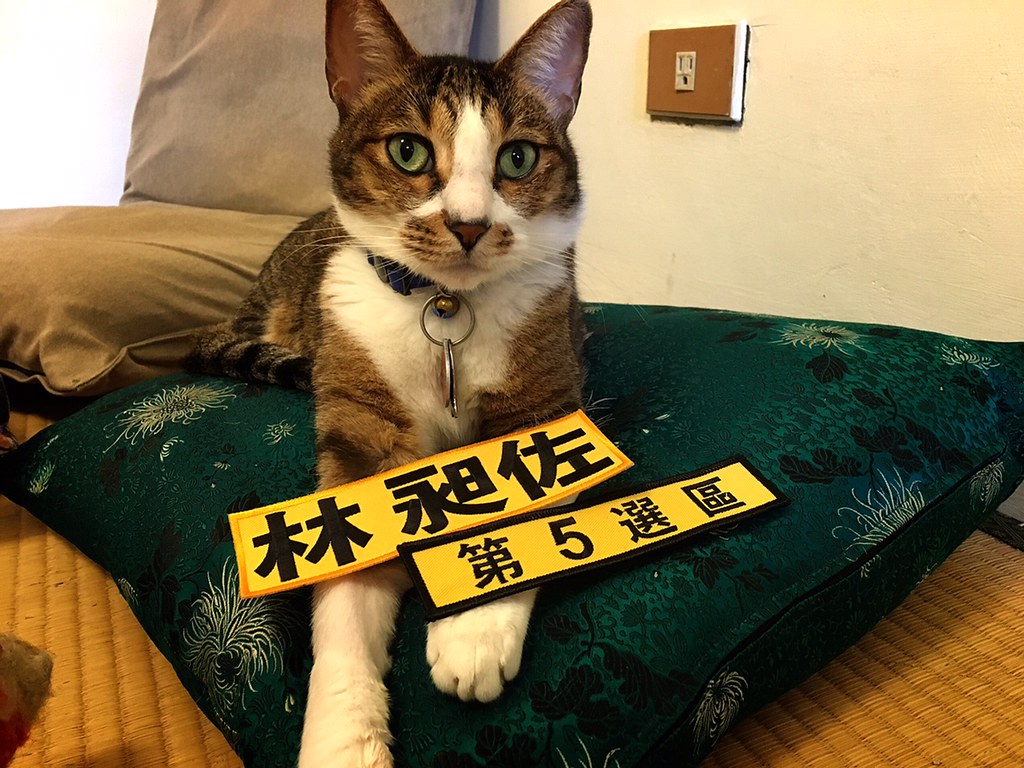
I may not have Taiwanese kiddies, but I do have Taiwanese kitties.
There are two things that are complicated to approach as a liberal foreigner who watches Taiwanese politics (especially through a non-expert lens, such as myself): which party to support, if any - certainly many Taiwanese have yet to find a party that appeals to them - and how to essentially support localist, to an extent "populist", movements.
Until the inception of the New Power Party, feeling a bit uncomfortable about the centrist rhetoric and general corruption (though not nearly as bad as the corruption of the KMT), not to mention the seeming incompetence at pushing their own platforms and ideas rather than simply reacting to KMT initiatives, I tenuously, uncomfortably, supported the TSU (Taiwan Solidarity Union). I liked their straightforward clarity of thought in the idea that Taiwan is not a part of China and this is just a logical conclusion based not only on history but on the reality of Taiwan's current situation and general public will. Their very rational pointing out of the fact that Mandarin was never the native language of Taiwan - it was forced on the Taiwanese by the KMT, who, when they came here were more of a colonizing force flanked by quite a few political refugees, but then took over the place and acted as though they had the right to rule despite nobody in Taiwan having much desire to be ruled by them. What is an unwelcome occupying force? A colonial one. Duh. Their noting that transitional justice simply has not been adequate, and many Taiwanese families still do not know what happened to their ancestors in the White Terror and martial law era.
All very clear, all very obvious.
But I never quite felt comfortable with my own support, because while at various protests and events the TSU had always been welcoming to me, there was a distinct underlying impression that many of their supporters did secretly believe in the idea of Hoklo nativism and tended, with their "Taiwan for the Taiwanese" (implication: Taiwanese = Hoklo) rhetoric, to drive away other groups in Taiwan , like Hakka and the various aboriginal groups, who might have otherwise tended to agree with their pro-independence platforms. I'm sure some of this is KMT propaganda, but that aside, reading their own literature, from the TSU as a source, also carried this impression.
I guess I always wondered if their "Taiwan for the Taiwanese, let's all speak Hoklo" rhetoric, despite their friendliness to me, would eventually morph into anti-foreigner sentiment in general. I'm a foreigner. How can I possibly feel totally comfortable with that?
So when the NPP (New Power Party) came along, it was like a breath of fresh air. Finally, an unashamedly pro-independence party that is socially liberal as I am, has made worker's rights a central tenet of their party platform (though I feel $26K in their 'fight for 26K' is actually too low), an anti-death penalty, strongly pro-LGBT party I could really get behind, with the added benefit of being founded by student activists and other Third Force powers that I have supported in the past. Plus, they are nationalists in that they believe, without reservation, in de jure Taiwanese independence, but they are not isolationists in the sense that so many nationalist parties are (from their platform: The New Power Party advocates that Taiwan actively participate in international society, that it should uphold conscience and defend human rights and justice more, and that it should carry out its international responsibilities.)
Finally, a party I can fully support, right?
Well, I'm still not so sure.
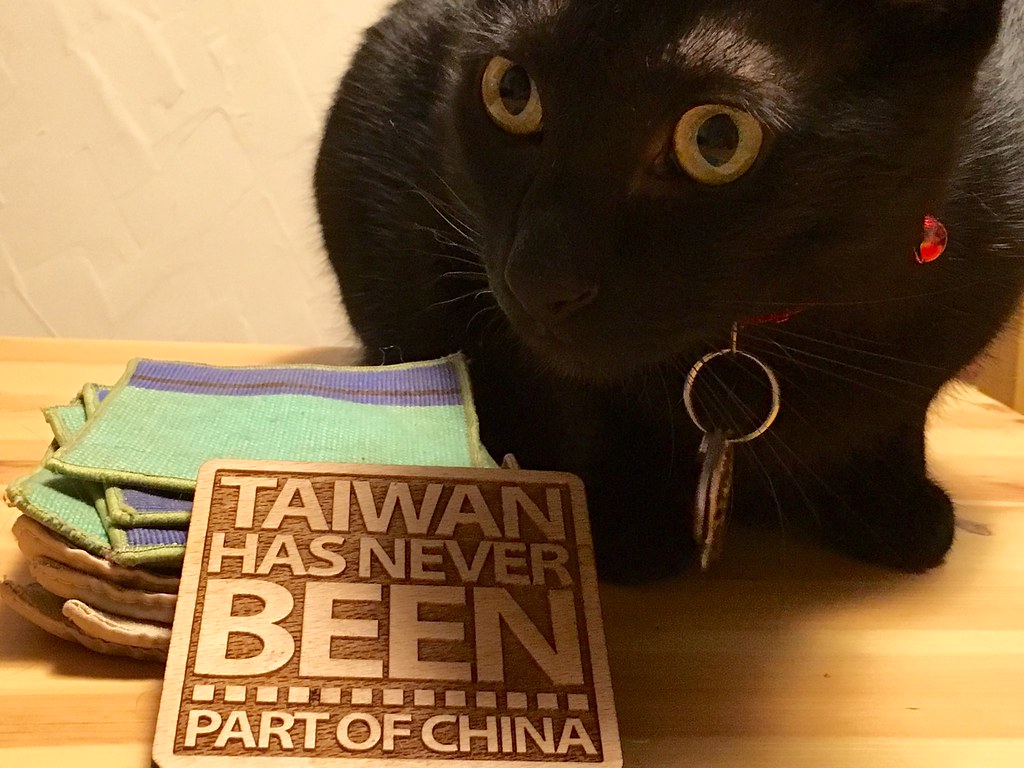
It has gone largely unnoticed, but the New Power Party is one of the groups resisting changes to the laws regulating foreign workers in Taiwan:
On top of that, loosening the requirements will play into the hands of employers who wish to maintain the current low salary structures. So far, several of the newly elected legislators, including the New Power Party (NPP) caucus, have publicly spoken out against the modified draft.
This is a bit of a blow - in that it blows quite a bit.
A few thoughts about the proposed changes to laws regulating, well, people like me. Foreigners. First of all, this sort of sentiment bothers me in similar ways to my not-unconditional support of Bernie Sanders. Sanders too, and many left-wing populists like him, seems to think that easing immigration restrictions drives down salaries, despite little evidence that this is actually the case and some evidence that it is, in fact, untrue. From the Washington Post article:
Today, he likes to talk about his opposition to it in humanitarian terms, calling guest-worker programs semi-slavery. But at the time, Sanders's public comments reflected on the economics of the program — specifically, his concern that bringing in guest workers would drive down wages for low-income Americans.
So, with my discomfort at Sanders touting - or having touted - an economic anti-immigrant platform that I don't support, obviously it would bother me the the New Power Party in Taiwan has taken up similar rhetoric.
Truly, we are not the ones driving down wages in Taiwan. We are right there with you, tryin' to earn a crust of bread through labor. To take an old cliche - why is the NPP pointing at foreign labor as a cause of stagnant wages? We are going after the same crumbs, yes, but look at your bosses, who took the whole damn cookie.
Honestly, the proposal to eliminate the minimum salary requirement and the onerous hiring requirements is a no-brainer, because Western white collar workers won't take less than what the law regulates anyway unless they have a reason not to, and even non-Western white collar professionals from, say, the Philippines or India, do expect international-level salaries. I doubt anyone in that segment of society, even from considerably less wealthy countries, went through a long education to become a professional only to take low pay in Taiwan. The folks who want to see restrictions eased don't want to accept stagnant pay any more than Taiwanese citizens do!
The few that would take such pay cuts or who would need to get a job without having the requisite Master's degree or two years' documented experience in the field are not that great in number and are not much different from local Taiwanese. They are not going to undercut locals - they're just not. They don't want to. They aren't quite me - I am an English teacher and corporate trainer by profession and with an APRC the rules don't quite apply to me. But, they are people like, say, a twentysomething who wants to live here but not teach English, and yet struggles to find a non-teaching job because the law keeps many firms from hiring people like her. Who isn't trying to take what Taiwanese have but rather just wants to build a good life for herself, and loves living in Taiwan.
It feels unnecessarily draconian towards an economic end that hasn't been shown to actually be a problem, and oddly self-destructive for the New Power Party for two reasons:
The first is that they themselves support greater international participation for Taiwan. Allowing more foreigners to come here and work without having to teach English (or wait until they are established enough in their fields that the low salaries on offer in Taiwan do not appeal to them) is a great way to do that. It would certainly help alleviate the feeling that Taiwan is a professional backwater.
The second is that, hey, young liberal twentysomethings - which is who most of these new workers would be - are natural allies to the New Power Party! The majority of them are the sort of workers-rights-loving, LGBT-friendly, anti-death-penalty, environmentalist, Taiwan-loving progressives that the New Power Party would be wise to court, if not for their votes (we can't vote) then for their international presence and ability to use soft power to share the cause of Taiwan with the world.
How better to raise the profile of Taiwan in the international sphere than to make it easier for this demographic of young folks to come, work here, fall in love with Taiwan and then go home raving about what a great country it is? How it is not China and deserves more from the world?
In short, we are natural political allies, NPP. Please don't do this to us. Don't throw us under the bus when we're not the ones who are taking the Taiwanese workers' cookie.
Set your sights instead on the bosses, business owners and powers-that-be who are taking your cookie.
Another reason this is problematic is that it diminishes hope for wannabe-permanent immigrants like us who are not sure we can stay forever simply because there is no viable path to citizenship for us (which is again done purposely, and is again extremely racist as the government allows its own citizens to have dual citizenship), and a lack of citizenship causes problems in our daily lives that may cause many to decide to leave. As I've written, we may be among that cohort someday.
Why should this matter?
Well, both the Taiwanese independence movement and the Third Force/student activist/New Power Party have been accused of being 'populist' - that they channel not only grassroots anti-elitist - in this case anti-KMT - sentiments (an essential component of populism) but, as an inevitable outcome of that, nativist anti-foreigner - in this case anti-China - sentiments. That they are extremely localist to the point of wanting 'Taiwanese independence' along the same lines as UKIP's "Britain for the British" or Trumpian "Build That Wall!" rhetoric.
First, some thoughts about populism. It's definitely got a bad reputation these days - think THEY TOOK OUR JOBS-style anti-globalization, pro-isolationist right-wing anger. But the original term "populism" comes from the idea of "from the people", and doesn't necessarily have to mean everyday people and Joe the Plumber types being anti-foreigner. That's right-wing populism, but the term itself has several possible definitions, including left-wing populism which only really shares a strain of anti-elitism with other versions but otherwise tends to appeal to a socialist sense of community and shared resources.
Yet, if you perhaps think that being a part of the UK isn't the best thing for Scotland but are not necessarily an isolationist/splittist/anti-foreigner type, or you think maybe the EU isn't quite working for you as a country but are otherwise more or less a socialist, or think that Taiwan ought to be de jure independent from China but don't see that nationalism as being anti-China but rather pro-Taiwan, you tend to get lumped into the right-wing populist camp by critics, whether you belong there or not.
And I don't think Taiwan belongs there. I really don't.
It also bothers me that left-wing and right-wing populists share not only an anti-elite establishment bent, but also an anti-immigrant bent. The latter based on ethnocentric zealotry of which only one component is "THEY TOOK OUR JOBS", the former based only on an economic argument that has no real basis of proof.
It is possible to be in favor of creating your own nation - in favor of self-determination in fact - but not an ethnic zealot nor an anti-foreigner isolationist. To recognize that perhaps free trade isn't always the best idea economically, that labor needs a fair shake, but to recognize that immigrants are decidedly not the problem. This is where I feel Taiwan's future is.
There aren't many countries or territories in Asia that have managed to build nations without an ethnic foundation - I can only think of Singapore and Hong Kong off the top of my head as being truly internationally diverse (others, such as Indonesia, Burma and India, are multi-ethnic but all ethnicities are local). You don't have to be Malay or Hokkien to be Singaporean, and you don't have to be Cantonese to be Hong Konger (although the Chinese government has something to say about that, wanting only people of Chinese ethnicity to be Chinese citizens and creating a problem of statelessness in Hong Kong).
I know I can never 'be Chinese', nor would I want to be. That's an ethnicity, and I am not ethnically Chinese. But there are countries - mostly Western ones - where you can 'be' that nationality without having to be a certain ethnicity. I do wonder, however, if I or someone like me could ever 'become Taiwanese' the same way one can 'become American', not only in official name (it is possible, just often insurmountably difficult, to get ROC citizenship) but also in the public consciousness. If Taiwanese doesn't have to mean Hoklo or "Han Chinese", if it can include aborigines and Hakka (whom I realize are technically Han, yes) and the children of Taiwanese with foreign spouses, can Taiwanese also mean, say, someone like me? Or, even more fittingly, a 'foreigner' who was born here? Could I actually live the 'Taiwanese dream', or is that closed to me because of my ethnicity?
I like to think that it could, and for every "you're a foreigner and you'll always be one even if you were born here", I feel like I meet someone for whom the "multiethnic diverse nation of Taiwan" idea is not only not crazy, but actually inviting. Who is happy to admit that Taiwan has had such a tumultuous history and is home to enough different kinds of people that being Taiwanese is a state of mind, not an ethnicity you are born with.
I like to think, anyway, that Taiwan might be something of a thought leader in Asia in this area. Certainly despite some setbacks it is a progressive nation by Asian standards.
This feels, to me, like a natural platform to support for the pro-international-engagement New Power Party, so again, it's disappointing that they're adopting the same problematic 'immigrants are a problem' rhetoric that a lot of lefty 'populists' really need to get out of their system. It certainly isn't going to come from the KMT (are they not the architects of the original anti-foreigner citizenship and worker laws?), the DPP doesn't seem particularly interested, the TSU, as above, is a bit too nativist, but I am actually surprised it's not on the NPP docket. If they're trying to differentiate themselves from the Taiwan = Hoklo reputation of the TSU, this is a great way to do it.
But getting over this "don't make it easier for foreigners, they're lowering our wages' hump seems like it's going to be a problem. If we can't even change the laws regarding who can work here as a foreign professional, how are we going to create a path to 'being Taiwanese' - to making it realistically possible to get citizenship and live here as regular adults and not eternal guests?
I want to wholeheartedly embrace the NPP...but again, as a foreigner who just wants a better life and isn't looking to take anything from Taiwanese, who is most definitively not holding the cookie that's been kept from local low-wage workers, I'm not sure I can. They don't seem to want to let me live the 'Taiwanese dream' any more than any other party, and it's a damn shame.
Do better.
Subscribe to:
Comments (Atom)

